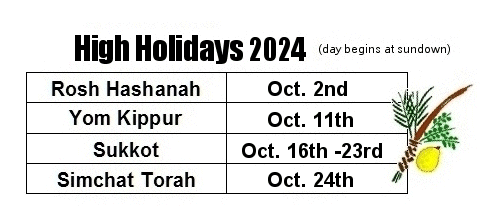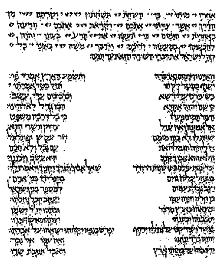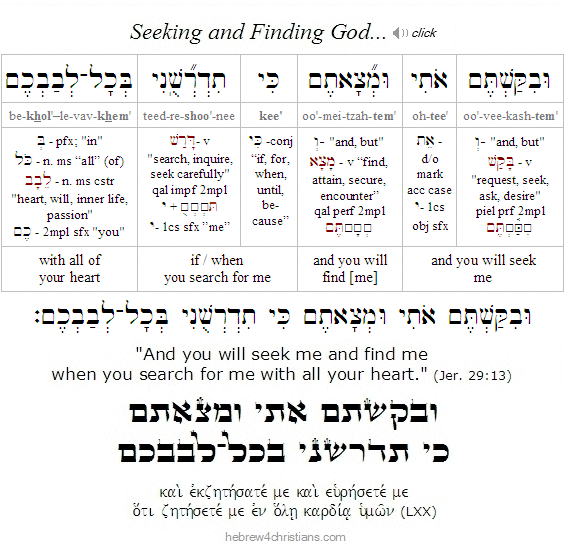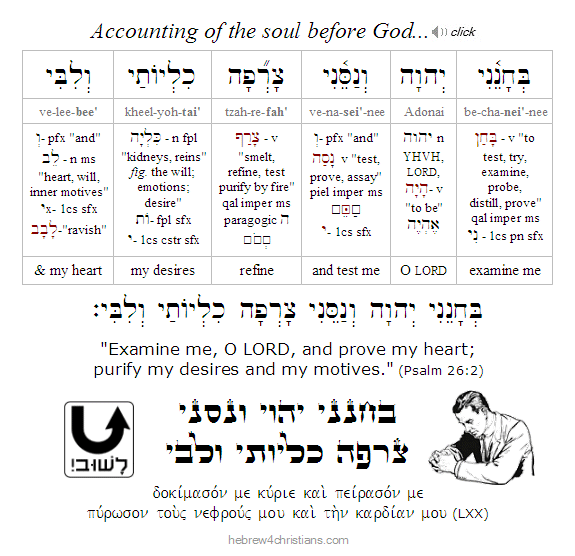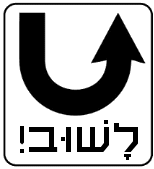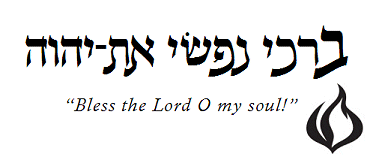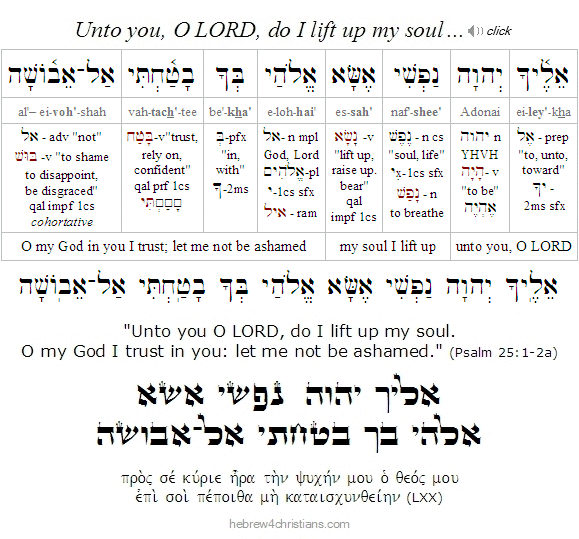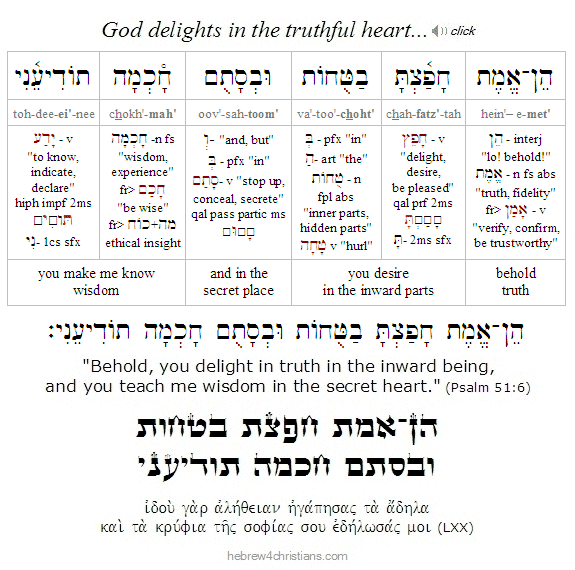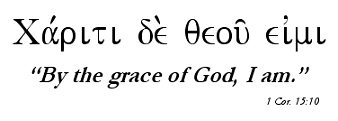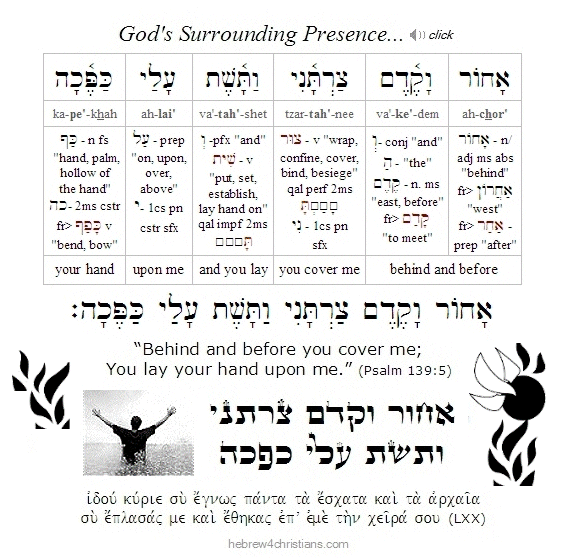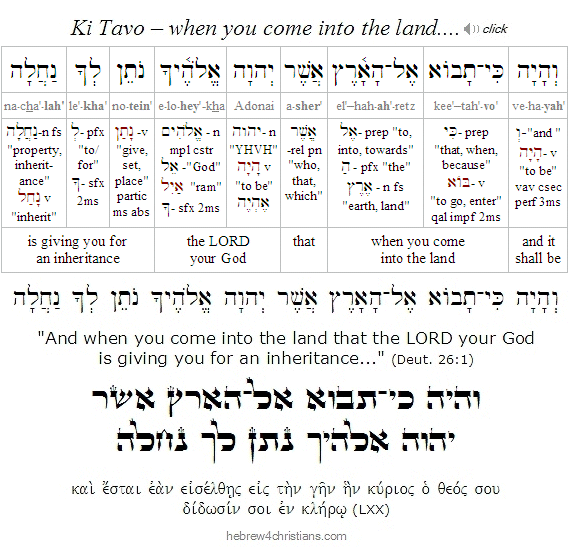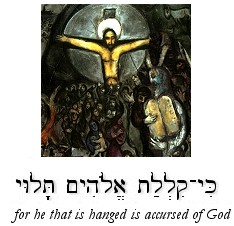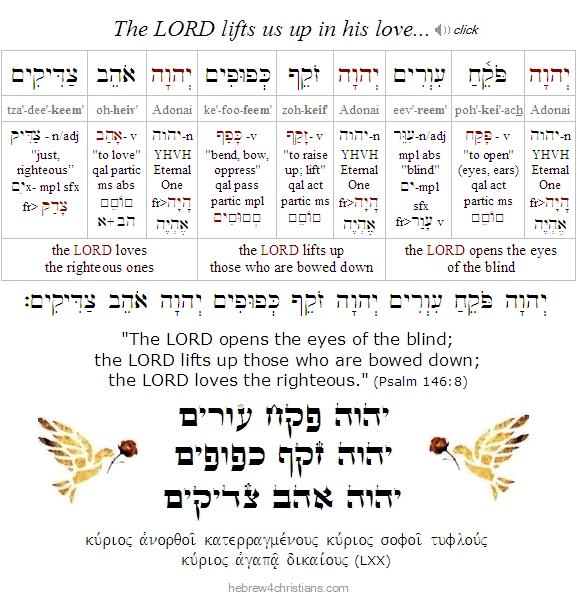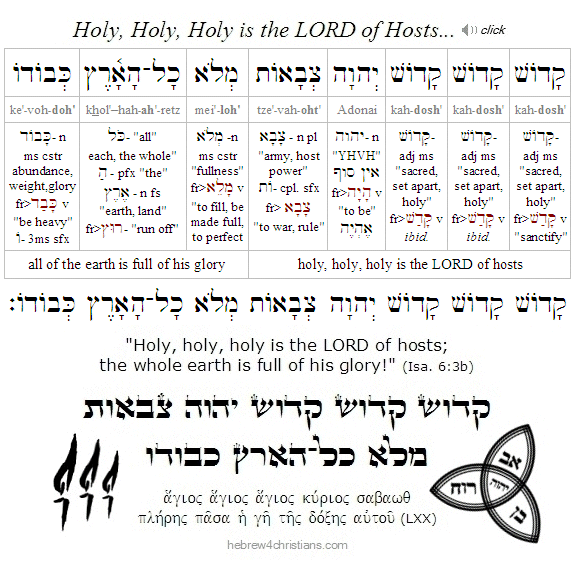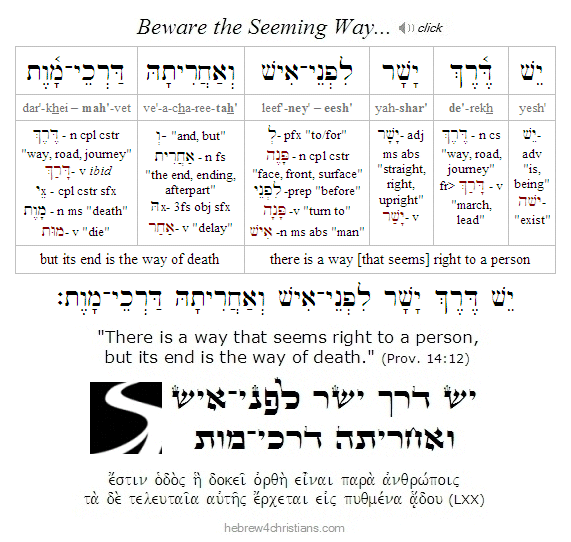|
Jewish Holiday Calendar
For September 2024 site updates, please scroll past this entry....
The Torah divides the calendar into two symmetrical halves: the Spring and the Fall, indicating the two advents of Messiah. The Biblical year officially begins during the month of the Passover from Egypt (called Rosh Chodashim, see Exod. 12:2), and the spring holidays of Passover, Unleavened Bread, and Firstfruits both recall our deliverance from Egypt and also our greater deliverance given by means of the death, burial, and resurrection of the Messiah, the great Passover Lamb of God. Yeshua was crucified on erev Pesach, buried during Unleavened Bread, and was resurrected on Yom Habikkurim (Firstfruits). The holiday of Shavuot (i.e., "Pentecost") both commemorates the revelation of the Torah at Sinai as well as the revelation of the Ruach HaKodesh (Holy Spirit) at Zion, in fulfillment of the promise given by our Lord....
The intermediate months of summer end with the advent of the sixth month of the calendar, called the month of Elul, which recalls the time Moses interceded on behalf of Israel after the sin of the Golden Calf. To commemorate this time of our history, we likewise focus on teshuvah (repentance) in anticipation of Rosh Hashanah and especially in anticipation of Yom Kippur, the great "Day of Atonement." In Jewish tradition the 30 days of Elul are combined with the first ten days of the seventh month (called the "Days of Awe") to set apart "Forty Days of Teshuvah" leading up to the Day of Forgiveness for Israel. Immediately following Yom Kippur, the mood changes as we begin preparing for a joyous week-long celebration called Sukkot (i.e., "Tabernacles") that concludes with the holiday of Simchat Torah.
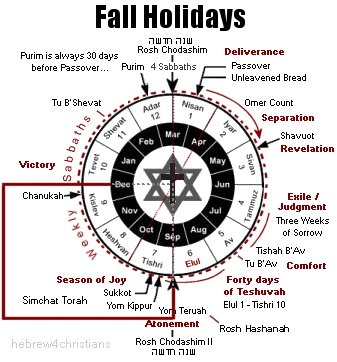 |
The Fall Holidays:

The fall festivals prophetically indicate the Day of the LORD, the second coming of Yeshua, the great national turning of the Jewish people, and the establishment of the reign of the Messiah upon the earth during the Millennial Kingdom in the world to come.
Note that in accordance with tradition, holiday dates begin at sundown. Moreover, some holidays may be postponed one day if they happen to fall on the weekly Sabbath:
1. Month of Elul (Mon. Sept. 2nd [eve] - Wed. Oct. 2nd [day])
2. Month of Tishri (Wed. Oct. 2nd [eve] - Thur. Oct. 31st [day]) - Fall holidays begin
3. Month of Cheshvan (Thur. Oct. 31st [eve] - Sat. Nov. 2nd [day])
- Five Sabbaths: Noach, Lekh-Lekha, Vayera, Chayei Sarah, Toldot
- Yom Ha'Aliyah - Honoring Israel's immigrants (Thur. Nov. 7th; Cheshvan 7)
- Sigd - 50th day after Yom Kippur; Ethiopian Jewish holiday (Tues. Nov. 26th)
4. Month of Kislev (Sat. Nov. 2nd [eve] - Mon., Dec. 30th [day])
- Four Sabbaths: Vayetzei, Vayishlach, Vayeshev, Miketz
- Winter Solstice: Fri. Dec. 20th, Kislev 20)
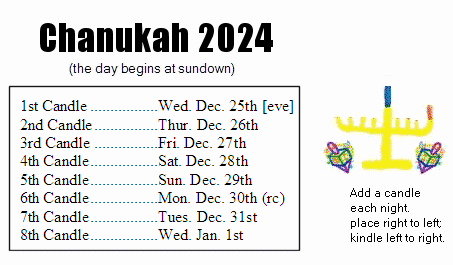
- Dates for Chanukah 2024 (5785):
- 1st Chanukah candle - Wed. Dec. 25th [i.e., Kislev 25] Christmas
- 2nd Chanukah candle - Thur. Dec. 26th [i.e., Kislev 26]
- 3rd Chanukah candle: Fri. Dec. 27th [i.e., Kislev 27]
- 4th Chanukah candle: Sat. Dec. 28th [i.e., Kislev 28]
- 5th Chanukah candle: Sun. Dec. 29th [i.e., Kislev 29]
- 6th Chanukah candle: Mon. Dec. 30th [i.e., Kislev 30]
5. Month of Tevet (Mon., Dec. 30th [eve] - Wed. Jan. 29th [day])
- Dates for Chanukah (continued):
- 7th Chanukah candle: Tues. Dec. 31st [i.e., Tevet 1]
- 8th Chanukah candle: Wed. Jan. 1st 2025 [i.e., Tevet 2] Zot Chanukah
- Secular New Year: Wed. Jan. 1st, 2025 (Tevet 1, 5785)
- Four Sabbaths: Vayigash, Vayechi, Shemot, Va'era
- Asarah B'Tevet - Fri. Jan. 10th (dawn); fast over the seige of Jerusalem
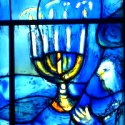 |
Note: For more about the dates of these holidays see the Calendar pages....
September 2024 Updates
Note: If any page content appears to be missing, please refresh the page...
The Prophetic Calendar...
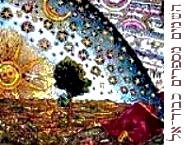
09.30.24 (Elul 27, 5784) The spring festivals (i.e., Passover, Firstfruits, and Shavuot) have been perfectly fulfilled in the first coming of Yeshua as Mashiach ben Yosef, and the fall festivals (Teruah, Yom Kippur, and Sukkot) will be fulfilled in His second coming as Mashiach ben David. Since the first advent fulfilled all of the spring mo'edim to the smallest of details, we believe that His second advent portends similar fulfillment as revealed in the fall mo'edim.
After the summer of harvest (John 4:35), the very first fall festival on the Jewish calendar is Yom Teruah (יוֹם תְּרוּעָה), which is a picture of the "catching away" of kallat Mashiach (the Bride of Messiah) for the time of Sheva Berachot (the seven "days" of blessing that follows the traditional marriage ceremony). Then will come the Great Tribulation and Yom Adonai - the Day of the LORD (יוֹם יְהוָה). The heavenly shofar blasts heard at Sinai will be reissued from Zion. First will be the gathering together of those who follow the Messiah (i.e., those declared tzaddikim because they trust in the merit of Yeshua's sacrifice), and then God's war against Satan and the world system will begin, culminating in the long-awaited coronation of the King of King of Kings - Melech Malchei Ha-Melachim (מֶלֶךְ מַלְכֵי הַמְּלָכִים).
Rosh Hashanah (or better, Yom Teruah) is therefore a sacred time that has prophetic significance for the Messianic believer, since it commemorates both the creation of the mankind by Adonai as well as the "calling up" of the new creation at the behest of Yeshua, when the sound of the heavenly shofar inaugurates the anticipated End of Days (1 Cor. 15:51-54; 1 Thess. 4:15-18). Indeed, "teruah" (תְּרוּעָה) is a "calling up" signal for those who belong to Messiah, sounded during the opening of the "Gate to the Wedding" of the great Lamb of God. It also prefigures the coming Day of the LORD and Great Tribulation period that marks God's judgment on an unbelieving world...
In this connection Kierkegaard wrote about the apostasy of our age when he wrote: "A fire broke out backstage in a theater. The clown came out to warn the public; they thought it was a joke and applauded. He repeated it; the acclaim was even greater... that's just how the world will come to an end: to general applause from wits who believe it's a joke."
Hebrew Lesson
Psalm 104:19 reading (click for audio):
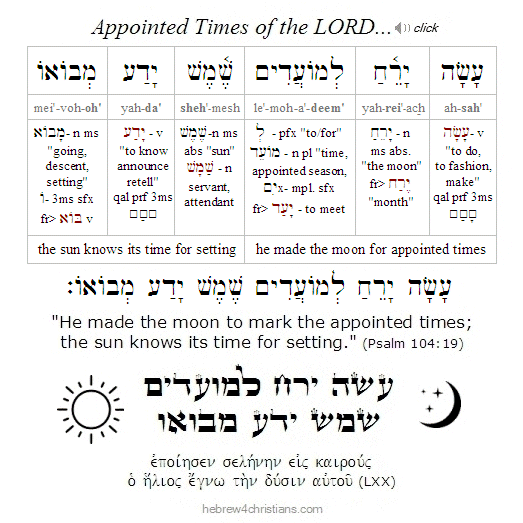 |
Note: For more on this fundamental topic, see "Introduction to the Jewish Calendar."
Shabbat Shuvah - שבת שובה
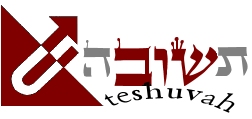
09.30.24 (Elul 27, 5784) The Sabbath between Rosh Hashanah and Yom Kippur is called Shabbat Shuvah - "The Sabbath of Return." It is called "shuvah" because the Haftarah reading begins, Shuvah Yisrael ad Adonai Elohekha (שׁוּבָה יִשְׂרָאֵל עַד יְהוָה אֱלהֶיךָ): "Return, O Israel, unto the LORD your God" (Hosea 14:2). Since this Sabbath occurs before the solemn hoiday of Yom Kippur (i.e., the Day of Atonement), it is customary to listen to a sermon from an honored Torah sage calling for teshuvah (repentance) at this time. "Seek the LORD while he may be found; call upon him while he is near. Let the wicked forsake his way, and the unrighteous man his thoughts; let him return to the LORD, that he may have compassion on him, and to our God, for he will abundantly pardon" (Isa. 55:6-7).
שׁובה ישׂראל עד יהוה אלהיך
כי כשׁלת בעונך
shoo·vah · yees·rah·el · ad · Adonai · e·loh·hey'·kha
kee · khah·shal'·ta · ba·a·voh·ne'·kha

"Return, O Israel, to the LORD your God,
for you have stumbled because of your iniquity."
(Hosea 14:2)

Download Study Card
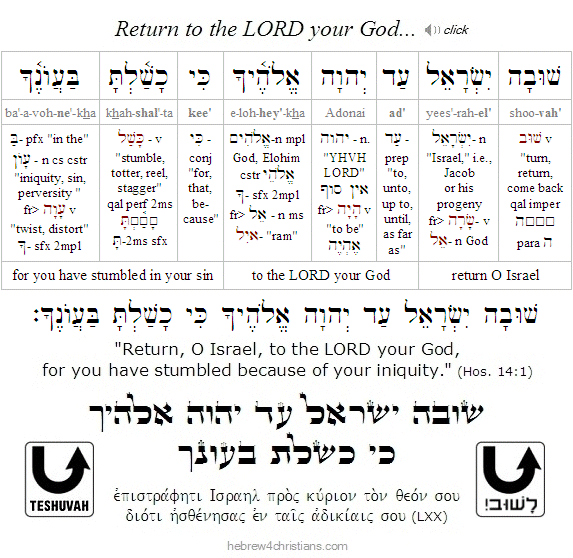
The Prophetic Song of Moses...
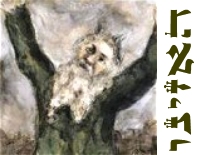
09.29.24 (Elul 26, 5784) In last week's Torah portion (Nitzavim-Vayeilech) Moses finished his long farewell address to the people of Israel and commissioned Joshua to be his successor. The LORD then foretold that after Moses' death the Israelites would "whore after foreign gods" and break covenant with Him. In light of this, Moses was instructed to teach the Israelites a great prophetic song called the "Ha'azinu." This week's portion provides the words of this song, which lyrically foretells of Israel's history (past, present, and the future redemption) and that warns the people not to stray from the path that God had commanded. Structured in the form of an "oracle," the Ha'azinu contains Moses' final words of prophecy given to the Israelites before he ascended Mount Nebo to die.
The oracle begins by declaring the righteousness of God. Moses reminded the people of all that God had done for them and then foresaw all the great gifts they would enjoy as God's chosen nation in the promised land. However, instead of thanking God for all these gifts, Moses foresaw that the people would "grow fat" and forsake the LORD for various "no-gods." This would cause God's anger to burn, and Israel's apostasy would eventually lead to defeat at the hand of their enemies and to eventual exile. All the various curses listed earlier in the covenant would then come upon the people: "I will heap disasters upon them; I will spend my arrows on them; they shall be wasted with hunger, and devoured by plague and poisonous pestilence." Indeed, God would have entirely destroyed the Jewish people were it not for His reputation among the nations, lest they should say, "Our hand is triumphant, it was not the LORD who did all this."
Ultimately, however, God will vindicate his justice and mercy before heaven and earth by saving Israel from her enemies and atoning for all her sins. The song ends, "Cry out, O nations, with his people, for he will avenge his servants' blood; he will take vengeance against his enemies, and will atone for his land and his people."
After Moses recited the words of this song, he encouraged the people to take the words of his prophecy to heart and to teach them diligently to their children. "For it is no empty word for you, but your very life, and by this word you shall live long in the land." The portion ends with Moses ascending Mount Nebo so that he could see the Promised Land before he died.
Hebrew Lesson
Deut. 32:1 reading (click for audio):
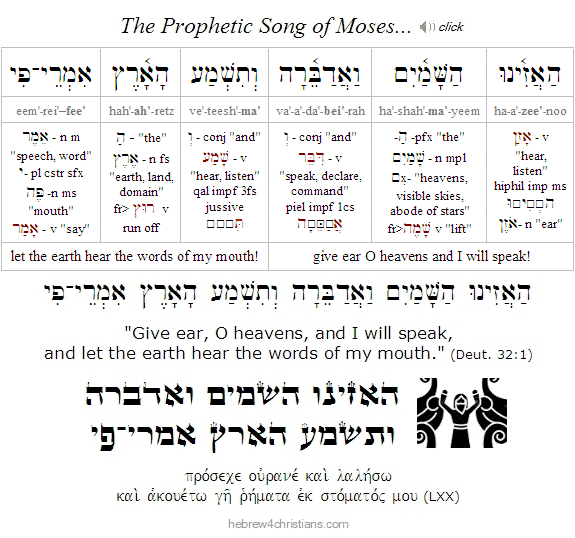 |
We read the Ha'azinu every year near the High Holidays, either just before or just after Yom Kippur. In the Sefer Torah (Torah Scroll), the prophetic song is written in a stylized two-column format with extra spaces. Each line of the shirah (song) is matched by a second, parallel unit (Talmud: Shabbat 103b).
The Ha'azinu reminds us that who we listen to ultimately decides our fate. It begins, "Give ear, O heavens (הַאֲזִינוּ הַשָּׁמַיִם), and I will speak, and let the earth hear (וְתִשְׁמַע הָאָרֶץ) the words of my mouth" (Deut. 32:1). The word ha'azinu (הַאֲזִינוּ) comes from verb azan (אָזַנ), as does the Hebrew word for "ear" (i.e., ozen: אזֶן). The Midrash Rabbah says that the ear (אזֶן) gives life to all the organs of the body. How so? By listening (שׁמע, shema) to the Torah. This idea is repeated in the New Testament: "Faith comes from listening to the Word of God" (Rom. 10:17). The Word of God (דְּבַר־אֱלהִים) is our very life, friends...
Rosh Hashanah Celebration...

09.29.24 (Elul 26, 5784) The holiday of Rosh Hashanah (ראש השנה), also called "Yom Teruah," begins Wednesday, October 2nd (at sundown) this year, that is, on Tishri 1 of the Jewish calendar. According to Jewish tradition, this holiday commemorates the creation of mankind by God. The Mishnah (earlier part of the Talmud) refers to Rosh Hashanah as the "Day of Judgment" (Yom ha-Din) since all of creation owes allegiance to the Creator and is accountable to Him. The Name Elohim (אֱלהִים) revealed in Genesis 1:1 bespeaks God as the Creator and Judge of the universe (the Name YHVH, on the other hand, reveals God's compassion, as the One who intimately relates to humanity and breathes into us the breath of life (Gen. 2:4)). In Jewish tradition on Rosh Hashanah we stand before God as our personal Creator and Judge. Many Messianic Jews believe that the sound of the shofar on Rosh Hashanah is a symbol of the rapture (ἁρπάζω) of the followers of the Messiah.
To prepare for a Rosh Hashanah home celebration, you will need a few basic things. Minimally you will need a couple holiday candles, a kiddush cup, some grape juice, challah (holiday bread), a few apples and honey, and a pomegranate... You will also need a shofar to sound at the end of the meal. For best results you should plan your meal, arrange your table, and decide which order things should go....
Steps for a home Rosh Hashanah Seder:
- Recite the blessing over the candles (usually 18 mins before sundown)
- Do kiddush over the wine/grape juice
- Recite the Shehecheyanu blessing
- Recite the Mo'edim blessing
- Recite the Hamotzi blessing over the (round) challah
- Recite the Shema (together, under a tallit)
- Recite Birkat Kohanim (blessing the children)
- Wish one another L'shanah tovah! Sing some holiday songs
- Sit at the table for the holiday meal
- Follow the simamin service (blessings over selected foods)
- Serve and eat the holiday meal together
- Recite Birkat Hamazon - giving thanks to God for the meal
- Recite blessings for the new year; taste apples and honey; pomegranate
- Recite the Shofar blessing and hear the shofar (at least 100 blasts for the evening)
- Tekiah [1 blast]
- Shevarim [3 wailing blasts]
- Teruah [at least 9 staccato blasts]
- Tekiah ha'gedolah [1 very long blast]
 Listen to the Shofar Listen to the Shofar
- Offer personal thanks to the LORD for the season...
We usually serve matzah ball soup or tzimmes, fresh salad, and a main course such as pomegranate chicken over rice with some green beans. During the holiday meal we also eat some "ceremonial foods" (i.e., simanim) and recite Hebrew blessings over these "first tastes" of the new year... For example we will eat a few almonds, some beets, a bite of fish, a nosh of star fruit, and of course apple and honey (tapu'ach udvash) for dessert. Please understand that you don't "have" to do any of this (though it is a blessing if it's done in the right spirit). If you are new to all this or feeling anxious, my heartfelt advice is to follow the path of peace - our Lord doesn't lay heavy burdens on us but lightness and grace... Shalom.
Note: All these steps are listed in the free H4C Rosh Hashanah Seder Guide.
About Rosh Hashanah...
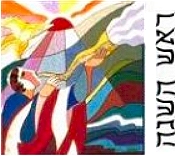
[ "The secret things belong to the LORD our God, but those things which are revealed belong to us and to our children forever, that we may do all the words of this law" (Deut. 29:29). ]
09.29.24 (Elul 26, 5784) Shalom chaverim. I want to contextualize this entry by quoting a passage of Scripture from the New Testament that admonishes us to remember our shared heritage with the Jewish people: "Brethren, I do not want you to be unaware that all our fathers were under the cloud, all passed through the sea, all were baptized into Moses in the cloud and in the sea, all ate the same spiritual food, and all drank the same spiritual drink. For they drank of that spiritual Rock that followed them, and that Rock was Messiah. But with most of them God was not well pleased, for their bodies were scattered in the desert. Now these things became our examples, to the intent that we should not lust after evil things as they also lusted. And do not become idolaters as were some of them. As it is written, "The people sat down to eat and drink, and rose up to play." Nor let us commit sexual immorality, as some of them did, and in one day twenty-three thousand fell; nor let us tempt Messiah, as some of them also tempted, and were destroyed by serpents; nor complain, as some of them also complained, and were destroyed by the destroyer. Now all these things happened to them as examples, and they were written for our admonition, upon whom the ends of the ages have come. Therefore let him who thinks he stands take heed lest he fall" (1 Cor. 10:1-12).
The very first word of the Bible -- the very first utterance of revelation -- is the Hebrew word "beresheet" (בְּרֵאשִׁית), which is commonly translated as "in the beginning" (Gen. 1:1). Note then that the Bible begins the account of creation using a word about time... That might seem a bit unsurprising or even trite, a little bit like saying "Once upon a time..." but it clearly indicates the significance of time in relation to the divine revelation given to us...
As we learn the Torah, which is the foundation of the other Scriptures of the Bible (including the New Testament), we repeatedly are instructed to sanctify (i.e., honor) certain occasions throughout the year. These are called "appointed times," or mo'edim in Hebrew, from a root word (יָעַד) that means to assemble together, to meet, and even to betroth... The first occurrence of the root occurs in the account of the creation when God said: "Let there be lights in the firmament of the heavens to divide the day from the night; and let them be for signs and seasons (i.e., mo'edim), and for days and years" (Gen. 1:14).
These appointed times were designed by God to be special occasions for human beings to have fellowship with him. Indeed, after God created Adam and Eve in the orchard of Eden, he explained that the Sabbath day was to be set apart in honor of the creation. God also regularly met with Adam and Eve in the "wind of the day" (i.e., לרוּחַ הַיּוֹם, Gen. 3:8) to instruct them about their responsibilities as his stewards of creation. God's teachings to Adam and Eve were later preserved as traditions within the godly line of Seth who had observed the "new moon" of the months and commemorated seasonal transitions. Similarly, the earliest forms of Passover celebrated the beginning of spring, Pentecost celebrated the first spring harvest, Sukkot (i.e., Tabernacles) celebrated the fall harvest, and so on. During these special times sacrifices to God were offered and feasts celebrated.
Moses did not write in a vacuum, of course, and he was quite familiar with the heritage of the godly line of Seth handed down through Noah's son Shem and his descendants. The ancient appointed times were later codified and sanctioned by God when Moses wrote the Torah during the years of the Sinai revelation. Therefore we note the Torah's calendar is divided into 360 days, 54 weeks, 12 months, 4 seasons, and 2 half-years.
There are two distinct "new years" on the Torah's calendar: one in the spring, on the first day of the month of Nisan, called "Rosh Chodashim" (Exod. 12:2; Deut. 16:1), which marks the season of the redemption from Egypt, and the other in the fall, precisely six full months later, on the first day of the month of Tishri, called "Yom Teruah" (Num. 29:1), a day to be celebrated by shouting (teruah) and the sounding of shofars and trumpets (Lev. 23:24).
Now the new year in the spring remembers the Exodus from Egypt (Passover) and the crossing of the sea, culminating in the 49 day (seven week) countdown to the giving of the law at Sinai (Shavuot / Pentecost), whereas the new year in the fall remembers God as our Creator, our Judge, the one who purifies us from sin (Yom Kippur), as well as the one who restores us to fellowship and surrounds us with his love (Sukkot / Tabernacles). (Note that the eight days of Passover in the spring correspond with the eight days of Sukkot in the fall.)
It has been said that the liturgy of the Jew is the calendar, and the two new years, then, serve as two axes upon which turn the theme and tone of the calendar year. For instance, we begin getting ready for the Passover every year just after the holiday of Purim. We then plan our house cleaning, the removal of chametz, and we review the story of the exodus from Egypt to ready ourselves for the Passover. During Passover we abstain from leaven and begin the countdown for seven weeks until we reach the jubilee of Shavuot, or Pentecost - recalling how God gave us the law at Sinai and made covenant with us to be his holy people.
The intervening summer months offer time for reflection, recalling the various tragedies that befell the Jewish people, such as the incident of the Golden Calf (Exod. 32:4) the tragic "Sin of the Spies" (Num. 14:22-34), and (later) the destruction of the Holy Temple (2 Kings 25; Jer. 52:12-16). The summer culminates in the sixth month of the calendar, called the month of "Elul." During this month we focus on "teshuvah" or turning back to God in repentance... Sermons are given admonishing us to repent; our Torah portions warn of the "great rebuke" (i.e., tochachah) that Moses warned would come if we turned away from God, and so on.
Because of this, Rosh Hashanah (another name for Yom Teruah) became associated with the time of divine judgment - the advent of Yom Adonai, or the "Day of the LORD" - wherein each soul would be examined by God in relation to his or her teshuvah and the decree established whether their soul would live or die in the forthcoming year.... Customs arose about making amends with others and joining in corporate confession of sin at this time.
According to Jewish tradition, on Rosh Hashanah the destiny of the righteous, the tzaddikim, are written in sefer ha'chayim, the Book of Life, and the destiny of the wicked, the resha'im, are written in sefer ha'mavet, the Book of Death. However, most people will not be inscribed in either book, but have ten days -- until Yom Kippur -- to repent before sealing their fate. Hence the term "Aseret Yemei Teshuvah" (עֲשֶׂרֶת יְמֵי תְּשׁוּבָה) - the Ten Days of Repentance arose in the tradition. On Yom Kippur, then, everyone's name will be sealed in one of the books.
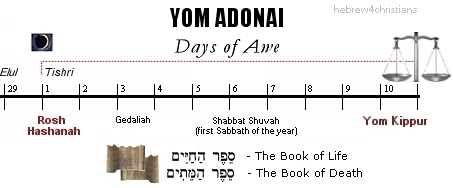 |
So from Rosh Hashanah until Yom Kippur there are ten days which provides a "last chance" to turn to God for forgiveness and reconciliation. Just five days after Yom Kippur, the joyous occasion of Sukkot begins - an eight day festival that rejoices over God's care and forgiveness of us, and that looks forward to the blessings of the world to come in heavenly Zion.
The intervening months of winter include the holiday of Chanukah, calling us to rededicate our lives to God, kindling lights during the darkest season to recall God's victory over the powers of darkness. Later the holiday of Purim occurs exactly one month before Passover, thereby restarting the cycle of the calendar for the advent of the new year of spring once again...
Yeshua observed the calendar given in the Torah, of course, and his ministry expressed its deeper meaning for those he came to save. The spring holidays (i.e., Passover, Firstfruits, and Shavuot) foretold his coming as "Mashiach ben Yosef," the Suffering Servant, who would die for our sins, be raised from the dead, and would commission the Spirit of God to write the law upon our hearts (Jer. 31:33). These things have been fulfilled in his first coming. The fall holidays will be fulfilled in his second coming as "Mashiach ben David," the Son of David, who will overthrow the oppressor Satan and establish the kingdom of God upon the earth.
We are presently living in the "summer of harvest" (John 4:35) when all the nations are given opportunity to turn to the Lord and be saved. These are also called days of Messiah's grace... The Shofar blast of Yom Teruah signifies the "catching away" of God's people, collectively called "the Bride of Christ," for the time of Sheva Berachot (seven "days" of blessing that follows the marriage ceremony). Then will come the Great Tribulation and the Day of the LORD.
Rosh Hashanah has prophetic significance for us, then, since it commemorates both the creation of the universe by God as well as the "calling up" of the new creation at the behest of Yeshua, when the sound of the heavenly shofar inaugurates the anticipated End of Days (1 Cor 15:51-54; 1 Thess. 4:15-18). It also prefigures the coming Day of the LORD (יוֹם יְהוָה) and Great Tribulation period that marks God's judgment on an unbelieving world... Maranatha.
Hebrew Lesson
Psalm 81:3 reading (click for audio):
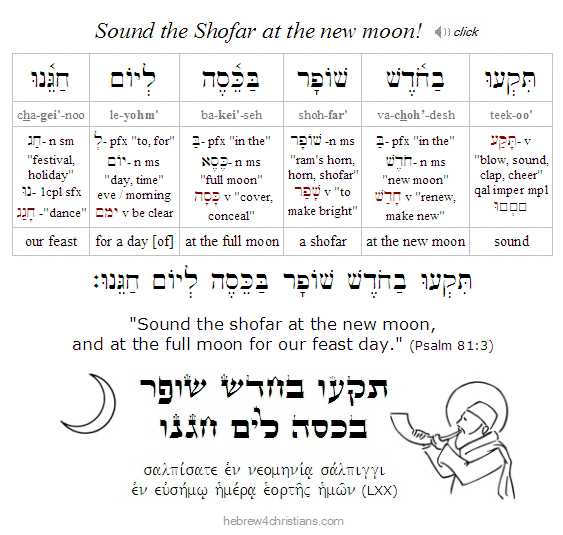 |
Come to the Savior...
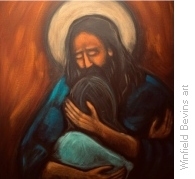
09.27.24 (Elul 24, 5784) "I thank thee, O Father, Lord of heaven and earth, because you have hidden these things from the wise and prudent, and have revealed them to babes.... Come unto me, all you that labor and are heavy laden, and I will give you rest. Take my yoke upon you, and learn from me; for I am meek and lowly in heart: and you shall find rest unto your souls. For my yoke is easy, and my burden is light" (Matt. 11:25, 28-30).
"Come unto me..." (בּוֹא אֵלַי) These are timeless words from our Savior who opens his heart to receive the "babes," that is, those who are simple at heart and cry out in their urgent need for God's help. "Come." This is his invitation to your heart, his personal call that beckons you to draw near to him in your trouble. In the midst of a confusing world and the babble of voices, the Savior cries out, "Come to me!" Turn away from the religionists and the so-called wise of the world, because the Father (את אבא), the Lord of heaven and earth (יהוה שמים וארץ) has hidden the truth of salvation from the proud of heart. God calls out to the humble, the lowly, and the broken; he looks to the poor and contrite of heart.
"Come unto me, all you who labor and are heavy laden." This includes you of doubting heart, weighed down by your anxieties and cares. You have gathered the sheaves and found little flax; you have toiled in the heat of day for little gain. "Come, you who are weary" of the news of the day, the sorrows of loss, the cruelly of the proud. "Come unto me" all who are weary of life, who ache in heart and dismay over the vain repetition of wickedness and sin. "Come unto me" all who feel like giving up, all who feel like they are dying inside...
"Come unto me," this is a message to your heart from the One who calls you, the heart behind the call, the Lord who reaches out to you in revelation and compassion, saying, "Come to me in your heaviness of heart, the utter depths of your sigh, in your weariness, your sorrows, and in your mourning, and I will give you rest, I will comfort you, I will heal your grief and give to the strong consolation of God's tender mercies and love.
"Take my yoke upon you. This is my yoke, my burden, and my passion - that you may enter my rest, know my peace, and draw strength from my love for you. Take hold and embrace my life given for you, to free you from the burden of suffering for your sins. This is the yoke of My love; this is the depths of spiritual rebirth, to know yourself as beloved because of the yoke of My love for you." This yoke "joins you" to his love. His yoke is for your heart, and you respond by taking up that yoke and sharing in what it means.
"Learn from me." This is the yoke of the disciple - to come under the tutelage of the love of God, and to know him in all your ways. "I am meek and lowly in heart," that is, he is mild, patient, kind, and gracious to you - and by responding to his acceptance and affirmation you will find "rest for your soul," you will be unburdened by the fears and distress of the ego, you will be set free from bondage to yourself.
"My yoke is easy." The Greek word translated "easy" means "full of grace," gentle and agreeable, and in Hebrew the word (נָעִים) is translated as "pleasant" and "joyful." Being in relationship with Yeshua is a matter of grace and communion. "My burden is light." The Hebrew word for "light" is "kal" (קל), meaning light, swift of foot, easily managed. Kal can also mean "simple" or essential. Indeed the burden of the Lord is weighty in earnestness but is carried by the grace of God's joy.
Paradoxically, this beautiful passage of Scripture distills the message of teshuvah with poignant simplicity and grace. "Come to me" is the essence of teshuvah, that is, turning to God for life. It is not about religious practices or liturgies; it is not even about morality or spiritual curiosity. It is about a radically new kind of life that is only known in a trusting relationship with Yeshua. He is the "way and the truth and the life" (John 14:6). No one can find eternal life apart from him. When we come to him and learn (i.e., receive) his love, we become new creations, reborn as beloved children, and heirs of all the promises of God. Teshuvah is the means to the greater end of knowing the heart of God. This is the essence of salvation itself, for there is no turning to God apart from Yeshua, who alone is the Savior and the one who returns us to God. Amen and Shabbat Shalom, chaverim!
Hebrew Lesson
Isaiah 43:11 reading (click for audio):
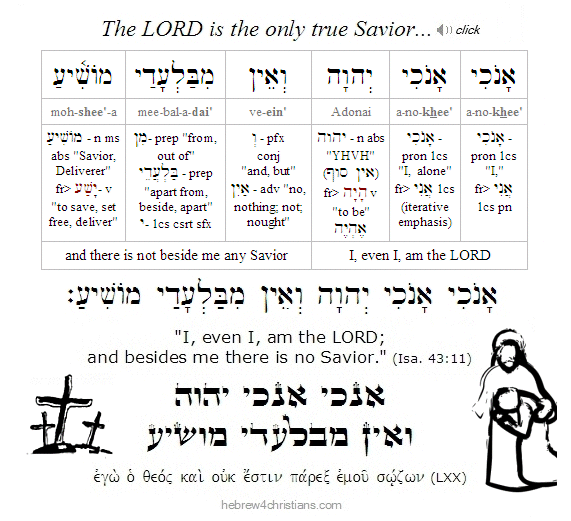 |
Our Ever-Present Mercy...

09.27.24 (Elul 24, 5784) Since Rosh Hashanah (יוֹם תְּרוּעָה) is regarded as the "Day of Judgment" (i.e., yom ha'din: יום הדין) in Jewish tradition, it is customary to offer additional prayers of supplication (selichot) before the advent of the holiday. These prayers appeal to God's compassion and often include the recitation of "shelosh esrei middot rachamim," that is, the thirteen attributes of God's mercy (Exod. 34:6-7). The thirteen attributes reveal the inner meaning of God's Name YHVH (יהוה) disclosed to Moses after the people had committed the dreadful sin of the worshiping the golden calf (עגל זהב) at Sinai. God is not only our Judge and Lawgiver (Elohim), but our Savior and our Healer (Moshia). In his great mercy He restores what we have broken; He overcomes our judgment by means of his abounding love given to us in Yeshua (Psalm 85:10). We therefore appeal to YHVH as the Source of Compassion, the "breath of life" (נִשְׁמַת חַיִּים) imparted to Adam on the day he was first created (Gen. 2:7).
The Torah teaches that the Name of the LORD (יהוה) means both ehyeh (אֶהְיֶה) "Presence" and rachum ve'chanun (רַחוּם וְחַנּוּן), "Mercy and Grace" (Exod. 3:14; 34:6-7). Yeshua said, "I go to prepare a place for you," which means that his presence and love are waiting for you in whatever lies ahead (Rom. 8:35-39). We live and move and have our being in God's love. To worry is "practicing the absence" of God instead of practicing His Presence... Trust the word of the Holy Spirit: "For I know the plans I have for you, declares the LORD, plans for healing peace and not for evil, to give you a future and a hope (Jer. 29:11). Amen.
Hebrew Lesson
Exodus 34:6 reading (click for audio):
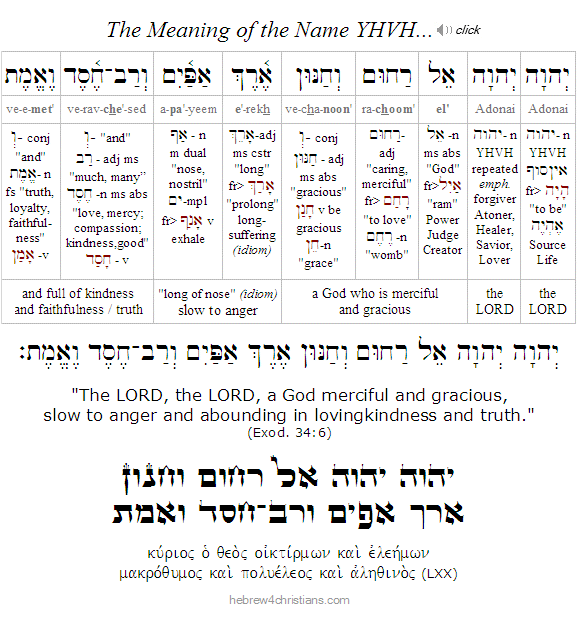 |
God's Absence and Teshuvah...
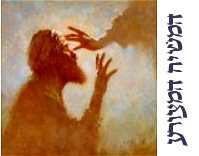
09.26.24 (Elul 23, 5784) These are days of teshuvah (ימי תשובה), or turning back to God.... In this connection the phrase hester panim (הֶסְתֵר פָּנִים) means "hiding of the face." It is often used when discussing the Book of Esther, where God's Name isn't mentioned even once, yet the hidden Presence is realized and revealed in the outcome of the story. In this sense of the term, hester panim is somewhat like the sun on an overcast day: Just because you don't see it doesn't mean it isn't there. God's providential care for us is at work at all times, whether we perceive it or not.
On the last day of Moses' life the LORD said to him, "Behold, you are about to lie down with your fathers. This people will rise and whore after the foreign gods among them in the land that they are entering, and they will forsake me and break my covenant that I have made with them" (Deut. 31:16). The LORD continues: "Then my anger will be kindled against them in that day, and I will forsake them and hide my face from them, and they will be devoured.... And I will surely hide my face in that day because of all the evil that they have done, because they have turned to other gods" (Deut. 31:17-18).
Unlike the happy thought that hester panim refers to God's hidden providence for good, in this case hester panim refers to the terrifying prospect of the withdrawal of the Divine Presence itself. God "hides His face" from us because our own desire for evil blinds us to the truth of His Presence. Hester panim therefore is not only "absence of Divine Presence," but "presence of Divine Absence." In other words, sin and selfishness causes the Divine Presence to remove from us, but that is precisely because we remove ourselves from Him. "I will hide... because you have turned..." The distance is therefore reciprocal: Selfishness turns God away from us and turns us away from God.
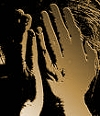 |
Hester panim is not only "absence of Divine Presence,"
but "presence of Divine Absence."
In difficult moments, many people cynically ask, "Where's God?" and yet they have no intention of turning from sin to seek the Divine Presence. They are quick to judge the Divine Absence as an excuse for the return to selfishness. This "hardening of the heart" leads to ever-increasing spiritual darkness and confusion... Finally the line is crossed and they become unable to turn away, unable not to sin (non posse non peccare). They are consigned to a frightful state: "God gave them up to a debased mind (αδοκιμον νουν) to do what ought not to be done" (Rom. 1:28).
People tend to blame God for the Divine Absence yet forget that God "hides His face" from those who elevate selfish desire over all other things... "Whoring after other gods" is nothing more than perverse self-exaltation, stubborn self-worship, and the incessant return to yourself as the object of ultimate concern in life.... This profound despair form is truly the "sickness unto death."
These are not happy thoughts, chaverim. In some tragic cases, the disease "reaches term" and the person actually dies. The "hiding of face" is then forever sealed. Since we have hidden our face from Him, God has hidden His face from us. God forbid that this should be anyone's ultimate spiritual destiny....
Is there a redemptive side to all of this? In some cases God "turns away" from us in order to afflict us and understand our need to return to Him: "It was good for me that I was afflicted, that I might learn Your statues" (Psalm 119:71). The sense of "Divine Absence" can be a gift that helps us seek the Divine Presence: "Draw near to God, and he will draw near to you" (James 4:8). The "dark night of the soul" can be a means of leading us to godly sorrow that leads to life (2 Cor. 7:10).
In keeping with the Days of Awe and the call to do teshuvah shelmah (a complete repentance), then, let me quote from the prophet Isaiah:
"Seek the LORD while he may be found; call upon him while he is near; let the wicked forsake his way, and the unrighteous man his thoughts; let him return to the LORD, that he may have compassion on him, and to our God, for he will abundantly pardon" (Isa. 55:6-7).
Let us "wait for the LORD, who is hiding his face from the house of Jacob, and hope in him" (Isa. 8:17). Wishing you teshuvah shlemah b'ahavat Yeshua - "A complete turning in the love of Jesus."
Hebrew Lesson
Jeremiah 29:13 reading (click for audio):
The Humility of Truth...
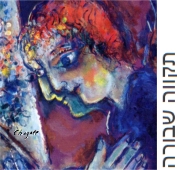
[ "Humility means living by the light of that-which-is-greater-than-me." - Jonathan Sacks ]
09.26.24 (Elul 23, 5784) An honest person is invariably a humble person, since honesty compels the heart to confess the truth that it is quite often ignorant, incapable of understanding even the simplest matters of life, and entirely powerless to heal itself... People may argue over words, concepts, and abstractions, inflating their opinions above even the Reality they purport to define, but the humble soul acknowledges that he doesn't really know much about anything... And if "all the efforts of the human mind cannot exhaust the essence of a single fly," then how is it that people get puffed up and proud regarding their supposed knowledge of life itself? It is far better to approach life in deep reverence, wonder, love, and childlike trust than to profess your dogma based on pride and illusions...
To a visitor who described himself as a seeker after Truth the sage said, "If what you seek is Truth, there is one thing you must have above all else." "I know," said the man, "an overwhelming passion for it." "No," the sage replied, "rather an unremitting readiness to admit you may be wrong."
Ours is an age marked by suspicion, arrogance and severely impaired thinking. Gone are the days of respectful dialog and the use of intelligence and logic. The self-styled deconstructionists of today are emotionally incontinent solipsists who are so self-absorbed that they cannot tolerate any dissent from their own narrative and perspective. They are lost to themselves because they lack self-transcendence. In general the so-called "intellectuals" today have nothing to offer other than despair, anger, and veiled threats of violence. These are signs of the death of a culture...
Sadly the postmodern derangement syndrome has affected even established disciplines such as medicine and science, where opinion has been politicized and dogmatized for the sake of economic interests (i.e., worldly power). Be careful of those who think they have all the answers; beware of those who think they know better than others what is best for them! As C.S. Lewis forewarned: "Of all tyrannies, a tyranny sincerely exercised for the good of its victims may be the most oppressive....Those who torment us for our own good will torment us without end for they do so with the approval of their own conscience. To be "cured" against one's will and cured of states which we may not regard as disease is to be put on a level of those who have not yet reached the age of reason or those who never will; to be classed with infants, imbeciles, and domestic animals" (God in the Dock).
It has been wisely said that "education is the process of turning cocksure ignorance into thoughtful uncertainty." Intellectual humility means admitting to the humbling reality that we all have biases and blind spots and therefore we may be mistaken. Such humility is an intellectual mark of grace, since it is willing to allow others their own perspectives while we work through our own convictions and truth claims. The difference between a real scientist and a fraud is that the real scientist will question his or her conclusions and be tentative in declaring the implications of his research, whereas the fraudulent scientist will irrationally demand that his or her ideas be accepted without question.
"Into this pond were flushed the ashes of some four million people. And that was not done by gas. It was done by arrogance, it was done by dogma, it was done by ignorance. When people believe that they have absolute knowledge, with no test in reality, this is how they behave. This is what men do when they aspire to the knowledge of gods." Science is a very human form of knowledge. We are always at the brink of the known; we always feel forward for what is to be hoped. Every judgment in science stands on the edge of error and is personal. Science is a tribute to what we can know although we are fallible. In the end, the words were said by Oliver Cromwell: "I beseech you in the bowels of Christ: Think it possible you may be mistaken." (Jacob Bronowski)
We all walk by faith, but faith (by definition) implies that we do not have all the answers in front of our eyes. "We see through a glass darkly," and that means we should respect the deep complexity that is bound up in all things, and furthermore that we should acknowledge that we are still learning, still growing, still seeking the truth for our lives. Those who refuse to admit their own ignorance regarding most things in life are fooling themselves. "God opposes the proud, but gives grace to the humble" (James 4:6; Prov. 3:34).
Let me add that regarding matters of faith we cherish the truth of revelation and regard it of utmost concern, but this means knowing from a place of real humility, for what do we truly know of the unseen world and of the heavenly power? You may profess perfect doctrine and yet exist untruthfully, whereas you might not have perfect doctrine, but exist truthfully. The devil knows how to quote Scripture, and often does so, but is a devil still. We must follow the path of peace, even if that requires that we "overlook" some of our doctrinal convictions for the sake of love. I don't mean we should throw away our principles, God forbid, but we rather hold them with an inward passion that is at the same time willing to be overlooked, to suffer, to be misunderstood, and even to be mistreated by others. The key here is not to indulge in self-pity or resentment, which does us no good. And above all we must ask God for his divine wisdom. God is faithful and true; if we ask Him for bread, he won't give us a stone (Luke 11:11).
Hebrew Lesson
Proverbs 3:34 reading (click):
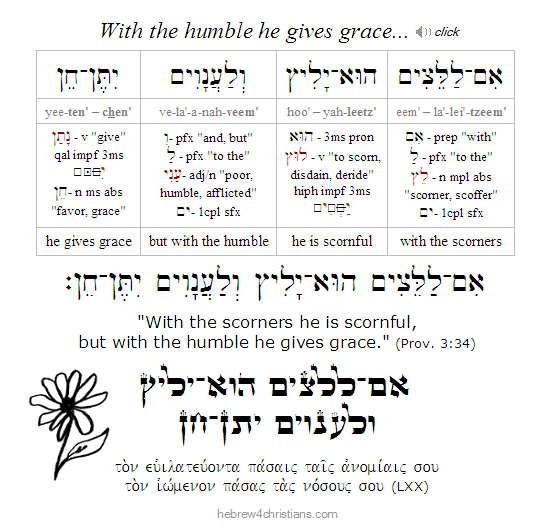 |
The Reign of His Spirit...
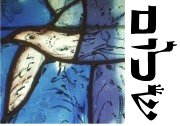
09.25.24 (Elul 22, 5784) Yeshua told his followers that the Kingdom of God (i.e., mamlekhet Adonai: ממלכת יהוה) is "within you" (Luke 17:21). This teaches us that the reign of the Spirit is not to be found "out there," nor is the kingdom to be regarded as a political structure of this world, but is realized in spiritual relationship - namely, in communion between the LORD God with your heart and your heart with the LORD God...
When we learn to believe clearly, yielding to the rule of God's heart, Yeshua says we experience the divine Presence within and among ourselves. As we turn to God, we understand that who we are is more vital than our outer appearance and contingent circumstances, and even more important still is who we are in relation to the will and blessing of our heavenly Father. Life in the kingdom means having a new identity, being a new creation (בְּרִיָּה חֲדָשָׁה), and that changes everything (2 Cor. 5:16-17).
Hebrew Lesson
Psalm 45:6 Hebrew reading:
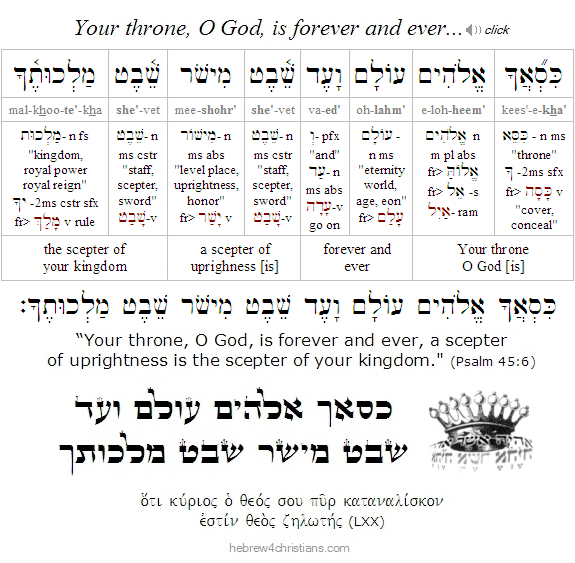 |
The Question of Teshuvah...

09.25.24 (Elul 22, 5784) Recall that God's first word spoken to Adam after he broke God's law was ayekah (אַיֶּכָּה), meaning "Where are you?" (Gen. 3:9), a question that introduces the themes of return and reconciliation that characterize the High Holidays.
The Hebrew word "teshuvah" (תְּשׁוּבָה) means an answer to a question, and its "shoresh," or root idea, is that of return (i.e., shuv: שׁוּב). The first time the root appears is after Adam and Eve sinned and hid from God in their shame (Gen. 3:7). The Lord then spoke to Adam saying "ayeka," not because he did not know where he was, of course, but because he wanted Adam to turn back to him.
The question, in other words, was for Adam to answer. Where was he, and how did he get there? God's question was not about his whereabouts in the garden, but his whereabouts in spiritual terms. "Where" Adam was revealed in his lost connection with God more than his hiding place among the fig trees of the orchard. Adam was now in the place of exile, separated from the original blessing and the Source of Life. To make his point, God removed his place in the original garden and told him that he would eat the fruit of the earth in sorrow all the days of his life, and that by the sweat of his face he would eat bread, "until you return (שׁוּבְךָ) to the ground, for out of it you were taken; for you are dust, and to dust you shall return (תָּשׁוּב). The wages of sin is death (Rom. 6:23).
The transgression at Eden was primordial and the consequence of separation from God was transferred to all subsequent generations, since Adam represented all of his progeny as their "federal head" (Rom. 5:12). In other words, Adam's curse was passed on to subsequent generations, but then so was the promise given to Adam and Eve that a child would be born among their descendants who would "undue the curse" and eternally reconcile God with humanity (Gen. 3:15). This "Second Adam" is Yeshua, who died on a tree to transform the bitter waters of death into purifying waters of life (1 Cor. 15:47). Access to the reconciliation of the Savior would be granted through heartfelt faith in God's faithful love, rectifying the doubt that was the essence of the original transgression within the heart...
Hebrew Lesson
Hosea 14:1 reading (click for audio):
 |
Lessons from Wasteplaces...

[ "Through the urging of his faith Abraham left the land of his forefathers and became a stranger in the land of promise. He left one thing behind and took one thing along: he left his worldly wisdom behind and took with him faith. For else he would not have left the land of his fathers, but would have thought it an unreasonable demand." - Kierkegaard ]
09.24.24 (Elul 21, 5784) Trusting God brings us into alignment with what is true and real, and therefore there is no greater tragedy than to be immersed into falsehood and delusion, lost inside yourself -- "tohu va'vohu," chaos and unreality. We find the "ground of our being" in our connection with the reality of God's presence given in Yeshua. He is the vine of life, and our communion with him imparts the flow of the life-giving Spirit within our hearts.
We "deny ourselves" when walk the life of faith, for deliverance from ourselves comes by the miracle of grace. Such denial redefines our relationship with olam ha'sheker, the false world experienced in our selfishness and in our fear. An essential aspect of discipleship entails learning to "see through" what seems to be real to apprehend what is truly real, and this revelation comes from the spiritual power that sustains and upholds all things. When we let go of our superficial view of things we begin to see the divine presence in our midst. "The Lord bestows his blessings there, where he finds the vessels empty"(Kempis).
It's been said that letting go of everything is a sort of "wilderness" experience. In the desert places we rely on God alone for everything. And because we rely on God alone to carry us in the way, we are subjected to temptation, as Israel was tempted in the desert for 40 years, and as Yeshua himself was tempted by the devil in the desert as well. The temptation is to lose our minds and be swallowed up in fear and despair. Such despair whispers that we can't rely on God, that we should hazard our own way, and that we can find remedy for the waste places of the heart using our own devices (Matt. 4:1-9).
Despair interprets the desert "naturally," that is, satanically, devoid of the light of God's truth. The devil delights in transforming the desert into a place of worldly glory and comfort so that we can forget all about God. This is the idea of the "world" (κόσμος), which is another type of desert - desolate, gilded, godless, and devoid of faith. The heart of faith overcomes the despair of the world, not by ignoring it, but by facing its illusions and refusing to consent to its false philosophy of life.
It is a battle to believe, but it is the "good fight of faith." Facing despair in the hope of our salvation in Yeshua overcomes the world and its self-chosen delusions (1 John 5:4). Yet we must face despair, even as we walk through the valley of the shadow of death on our way to the home of God's heart.... As Thomas Merton wrote: "Only the man who has had to face despair is really convinced that he needs mercy. Those who do not want mercy never seek it. It is better to find God on the threshold of despair than to risk our lives in a complacency that has never felt the need of forgiveness. A life that is without problems may literally be more hopeless than one that always verges on despair." Amen, the blessing of despair is the invitation to find life in God.
The walk of faith requires courage and divine strength... The human mind reasons and therefore fears, but the heart is the center of our being, the core of who we are. The heart does not reason its way to love but instead allows love to inform and direct reason. Therefore God asks our hearts to trust in him, and he does not allow calculated human reason with its fears to move us on the way (Isa. 55:8). When we receive divine grace to faithfully suffer, we hear the Spirit whispering back to us: "Be not afraid..." "Live in me..." "Walk in the light..." "I am with you always..." "You will endure..." "You are loved..."
Hebrew Lesson
Psalm 73:26 reading (click for audio):
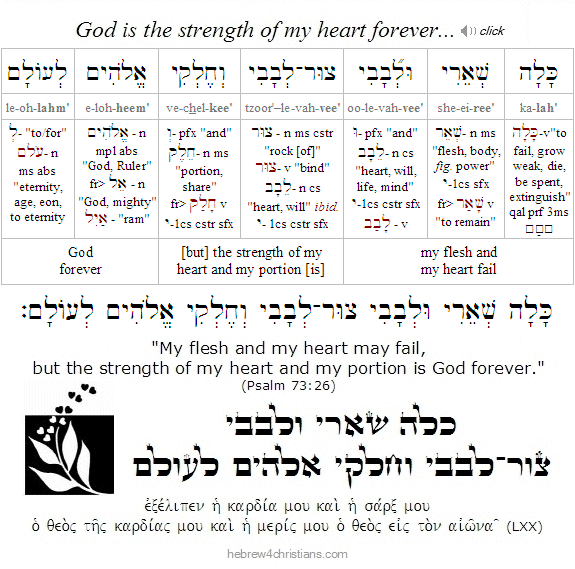 |
The Miracle of Teshuvah...
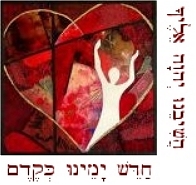
09.23.24 (Elul 20, 5784) Have you ever considered what the "self" really is? We tend to think of it, I suppose, as a conscious and emotional "center" of experience that is distinct from others and that has a sense of continuity through time and place. However, the self (or soul) has the ability to "transcend" itself, that is, to become conscious of itself, and this sets up an inner "dialog" within that enables the self to examine its own thinking, or to regard itself in relation to itself.... In this connection Soren Kierkegaard wrote of two types of "despair," by which he meant a condition of being wrongly related to your self. First, you can despair by rejecting (or denying) the self, and second, you can despair by elevating and exalting your self. In the first case the self is "lost" or abandoned by various forms of escapism; in the second case, the self is "idolized" and given god-like prerogative; in either case, however, the self is in despair because it is not grounded in the truth of reality, since there can be no true "self" apart from relationship with God who is the ground of all being...
This is connected with the task of cheshbon ha'nefesh (חֶשְׁבּוֹן הַנֶּפֶשׁ), or taking account of ourselves to do teshuvah (i.e., repent). Note that Kierkegaard understood the experience of the "self" as a conscious "synthesis" of the infinite/finite, the temporal/eternal, and freedom/necessity, all in relationship to God, who is the Source and End of self-conscious life. We will exist in a state of "despair" when we attempt to deny any one of these paradoxes and thereby choose to understand ourselves apart from relationship with God. We all stand at the "crossroads" of the eternal and the temporal, and we can only know ourselves for what we are when we surrender to God for each irrepeatable choice of our lives. Because of this, teshuvah (or "repentance") is an ongoing activity of the heart - the "daily bread" and sustenance in the way of becoming whole before God.
In your fight against evil, it is important not to become evil yourself, or as Nietzsche once sardonically said, "Whoever fights monsters should see to it that in the process he does not become a monster. And if you gaze long enough into an abyss, the abyss will gaze back into you." Applied inwardly this means that we are careful not to hate ourselves in the battle we have with our sin. We can escape the "shame-pride" cycle when we turn away from ourselves by knowing ourselves only in relationship with the Lord who loves and gave himself for newness of life. We turn away from the hell of our past mistakes and turn to God who is our only remedy from death. When we know ourselves only through God's love in Yeshua, we find ourselves as beloved in relation to Him.
Any idea of the "self" apart from God is a dead-end (Prov. 14:12). Indeed, if we find the courage to honestly look within we soon discover that we are filled with violent desires and are loveless at heart: "For out of the heart comes evil..." (Mark 7:21; Jer. 17:9). The essence of Torah is to love, to "do good and no evil," but we are inherently selfish, judgmental of others, calloused, and proud. So how can we do the impossible?
There is a persistent temptation to regard our inability to love as the result of something other than our own inner perversity, or what the Bible calls "spiritual death." If we are not careful, we will pray that the Lord will show mercy and compassion on that which is to crucified, buried, and taken away. God does not reform our carnal nature but puts it on the cross to be done away, and then he replaces it with a radically new nature based on the Spirit and resurrection life... This great miracle of God is found in union with the Messiah's life. "Live in me and I will live in you," Yeshua says, "as the branch cannot bear fruit by itself, unless it finds life in the vine, neither can you, unless you find life in me; for apart from me you can do nothing" (John 15:4-5). You cannot do the impossible, but with God all things are possible (Mark 10:27; Phil. 4:13).
Therefore the ability to love comes by the miracle of God (Ezek. 36:26; 1 John 4:19). As we live in Yeshua, we find life, love, light, truth, and salvation from the hell of a loveless heart. Unite yourself with his death, burial, and resurrection; reckon yourself to be immersed into him, death-for-death, life-for-life (Rom. 6:8-11; Col. 3:1-4). "Unless a seed of wheat falls to the ground and dies, it abides alone..." (John 12:24). Yeshua is the source of all life, and we find nourishment, strength, and fullness of joy as we connect with him.
By faith therefore affirm: "I have been crucified with Messiah, and it is no longer 'I' who live, but Messiah who lives in me" (Gal. 2:20). There is a new "I" that comes from above, known only in spiritual relationship with the Savior. The miracle of the exchanged life comes as we surrender to the truth of what God has done for us (2 Cor. 5:17). That's the essence of the gospel, "the power of God for salvation to all who believe" (Rom. 1:16). Therefore we do not attempt to crucify ourselves, or labor to reform our lower nature, but we instead accept that we already have been crucified by the mercy and power of God. We clothe ourselves in the robes of his righteousness as we celebrate God's redeeming love for our lives. Only then are we empowered by the Spirit to truly "love the LORD and keep his charge"; and only then will we have a true self... Amen.
Hebrew Lesson
Psalm 139:23-24 reading (click for audio):
A Closing Thought...
Though we are given a new heart at the time of our regeneration, we are still saddled with the sinful lower nature, and that explains why we are instructed to become sanctified by "putting on" our spiritual self and "putting off" the carnal one (see Gal. 3:27; Eph. 4:24; Col. 3:10; 1 Thess. 4:3; etc.). We are to "mortify" (put to death) the sinful nature by faith in the power and provision of God (Col. 3:5; Rom. 8:13) As it is written: "The night is far gone; the day is at hand. So then let us cast off the works of darkness and put on the armor of light. Let us walk properly as in the daytime, not in orgies and drunkenness, not in sexual immorality and sensuality, not in quarreling and jealousy. But put on the Lord Yeshua the Messiah, and make no provision for the flesh, to gratify its desires" (Rom. 13:12-14).
Though followers of Yeshua are made into a "new creation" and all things are "made new" (2 Cor. 5:17) we nevertheless must practice our spirituality by being "renewed in the spirit of the mind" and by consciously choosing to "walk in the Spirit" (Eph. 4:23-24; Gal. 5:16). Therefore go forward in faith; do not focus on your failures but on His victory secured on your behalf. We all struggle with sin in our lives, but the difference for some is that they are called by God and are chosen to know him despite the common failings of the fallen human condition. Count yourself among those who must "fight the good fight of faith," and above all else, never let go of your hope in God's passion and love for you.
Shalom v'kol tuv chaverim....
 |
Torah of Death and Life...
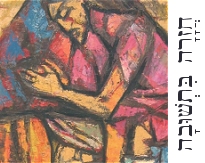
[ Torah explains that death was "inherited" from the rebellion of Adam, who represented humanity as its federal head, and that deliverance from death is given in Yeshua, the "Second Adam" who bore our curse on the cross and restored our lost estate by his resurrection. ]
09.23.24 (Elul 20, 5784) Why does God want us to face the truth about death? Why does Moses ask God to teach us to "number of our days?" (Psalm 90:12). The reason is that by nature people deny the reality of death - they hide their eyes from it, ignore it, and pretend it's not there - so they can continue to live under the illusion that they are in control of their lives, that they are the center, that they are immortal little "gods." Death threatens the ego and humbles us to confess the truth about life, namely that we are not in control, that we cannot choose to be immortals, that we do not have power to exist in ourselves, and therefore we need life from a radically different source - spiritual life - wherein we receive a new identity and a new being found in relationship with God.
The "natural man" regards death as an offense or as "absurd" because it splits us in two, creating a "divided house" that cannot stand. The ego demands to be godlike, important, valued as sacred, etc., yet the prospect of death crushes the aspiration and yields alienation from reality. This creates a painful tension or dualism within the heart where the meaning and purpose of life is lost.... The message of the gospel begins precisely there, however, speaking to broken people who thirst for life but find themselves living on "death row" - people who are humbled and who understand they cannot heal themselves from the "sickness unto death," as Kierkegaard used the term. The remedy is not to deny death or to live as if death is not a genuine horror, but to understand it as our natural estate, brought about by sin that exalts the ego over the God who made us.
The power of the gospel is to partake in a new source of life and to be healed from the sickness of death by God's miracle in Messiah (2 Cor. 5:17). "Jesus saves" is not a cliché for the faith but the sober truth of reality. It is by our union or identification with Him, by the agency of the Holy Spirit, that we are imparted new existence, true spiritual being, that is not subject to the natural law of sin and death (Col. 3:9-11). Being "in Messiah" means you are "justified," that is, welcomed, affirmed, accepted and declared righteous by God, and that you are set free from the condition of "being unto death." You partake and share in the life (relationship) of God based on his redeeming love: you are "adopted" by God, made a member of his "household," and attain the inheritance of which is eternal life. Consequently you cry out "Abba, Father" to God who watches over you and leads you through the days of your sojourn here on earth (Rom. 3:32). Despite walking through the shadowy byways and tribulations of this world, you refuse to let death define you or be the last word: you trust that your Father is with you, working all things for your ultimate good (Rom. 8:28). You know who you are, where you are going, and what your end is because of Yeshua our Lord.
Facing death is essential because the message of the gospel must be grounded and framed in the language of our wretched desperation as lost souls in this world (Rom. 7:24). Death is the central problem of existence, and death is therefore serves as the "propaedeutic" that leads us to the salvation found in Yeshua the Messiah...
The dualism of life shows up within our hearts as well, as we wrestle with our own faith and with "double-mindedness," that is, the ambivalence that results from not having our minds entirely made up. On the one hand, we need to confess the truth of our radical sinfulness, our depravity, our brokenness, our legacy from Adam, and so on, while on the other we must learn to know ourselves as the "beloved" and to find faith that God's blessing indeed belongs to us -- that Yeshua now represents us and gave his life for us -- despite ourselves. We have to be willing to take God's new name for us and believe that God has transformed our ultimate nature for eternal good. We have to be renamed from "Jacob" to "Israel," even as we yet know ourselves as both... In other words, we must learn to "put on" the new nature and to "put off" the carnal reasoning of our former life. The answer for us is found in the word "miracle," as God in great mercy and compassion regenerates us, comforts us, and then guides our way back to the truth of his salvation.
Hebrew Lesson
Psalm 90:3 reading (click):
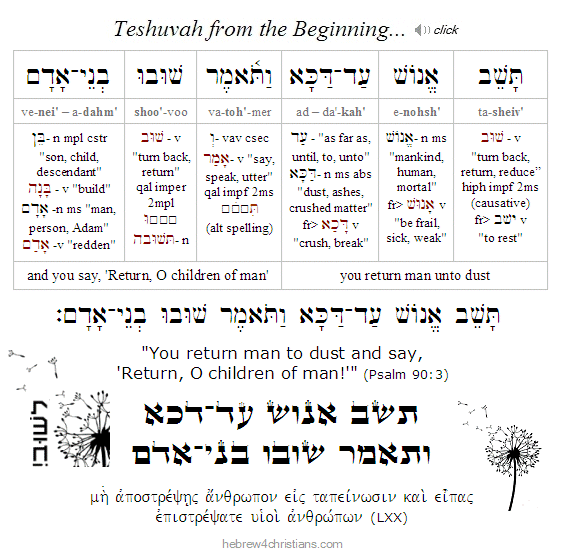 |
He Hears your Prayers...

[ "As long as there is a believer, this person, in order to have become one, must have been, and as a believer must be, as contemporary with Christ's presence as His contemporaries were. This contemporaneity is the condition of faith, and, more sharply defined, it is faith." - Kierkegaard ]
09.23.24 (Elul 20, 5784) Yeshua told us: "If you live in Me, and My words live in you, ask whatever you wish, and it will be done for you. By this My Father is glorified, that you bear much fruit; so you will be My disciples" (John 15:7-8).
If you really believe that Yeshua is alive right now, with ears and heart open to your every prayer, then wouldn't this be the most important truth you could possibly know? and wouldn't your prayer to Him be the most significant thing you could ever do?
A life of prayerful communion with the Lord is the highest form of life we can experience this side of heaven. As our Lord further said: "You did not choose Me but I chose you, and appointed you that you would go and bear fruit, and that your fruit would remain, so that whatever you ask of the Father in My name He may give to you" (John 15:16). Amen, this is the "now" covenant we have with the Lord...
So be encouraged to call upon the Lord for help: Come boldly before the Throne of his Grace (Heb. 4:16). "Ask, for it will be given to you; seek, and you will find; knock, and it will be opened to you. For everyone who asks receives, and he who seeks finds, and to him who knocks it will be opened" (Matt. 5:7-8). Amen.
Hebrew Lesson
Psalm 145:18 Hebrew reading:
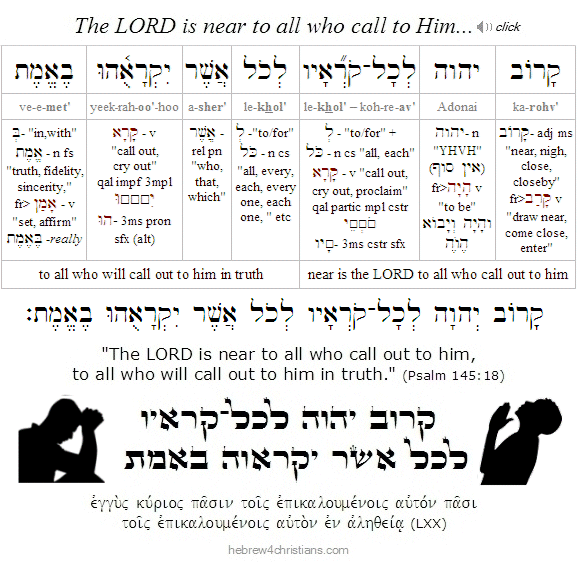 |
Parashat Vayeilech:
The Last Days of Moses...
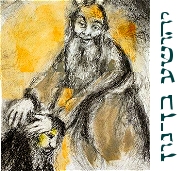
09.22.24 (Elul 19, 5784) In our first Torah reading for this week (i.e., parashat Nitzavim), Moses formally gathered the people of Israel together to ratify their covenant with the LORD. Moses then pled with the people bacharta ba'chayim - to "choose life" by pursuing the path of obedience to the Torah and its commandments. If the Israelites would do so, they would be blessed and prosper as God's chosen nation; but if not, they would be subjected to hard exile, persecution, and the threat of utter destruction.
In our second reading (i.e., parashat Vayeilech), Moses announced his impending death and transferred the leadership of the Jewish nation to Joshua (יְהוֹשֻׁעַ), a type of Messiah who would bring Israel into the promised land. Moses continued his speech but foresaw that despite his appeals, the people would turn away from the covenant, which would cause God's face to turn away: "And hiding I will hide My face (הַסְתֵּר אַסְתִּיר פָּנַי) on that day, because of all the evil they have committed" (Deut. 31:18). The sages note this verse is grammatically unusual because of the double use of the word "hide." If you do not know that God is "hiding," you will not seek for Him; but if you sense within your heart that God is hiding, you are invited to return to Him, as King David said, "When you said to my heart, 'Seek my face;' my heart said to You, 'Your face, LORD, will I seek' (Psalm 27:8).
Hebrew Lesson
Psalm 27:8 reading (click):
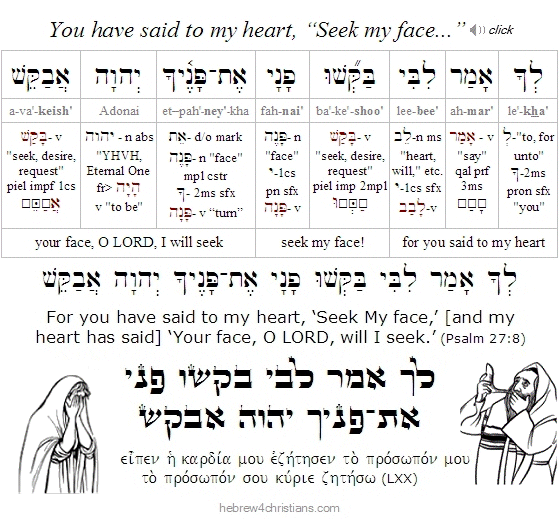 |
In this connection we note that Yeshua often spoke in the form of a parable (παραβολή) to "code" his meaning, to make it accessible only to those who were genuinely willing to make comparisons, to reason analogically, and so on (Isa. 1:18; 1 Cor. 2:13). He used "indirection," allusion, allegory, and "figures of speech" (παροιμία, lit. "[speech] beyond the usual way"), in order to provoke people to explore and ask the hard questions about life... "Truly, you are a God who hides himself, O God of Israel, the Savior" (Isa. 45:15).
"For God so loved the world" that He disguised himself as a bondservant to die in shame upon a cross; "God so loved the world" that he became entirely unesteemed -- "despised and rejected of men, a man of sorrows, acquainted with grief" (Isa. 53:3). Yet even Moses foresaw the stupor of the people in relation to the truth of God (Deut. 29:4). Regarding the "hiding of face," in His sovereign judgment God decreed: "They know not, nor do they discern, for he has smeared their eyes so that they cannot see, and their hearts, so that they cannot understand" (Isa. 44:18). God "gave them over to their stubborn hearts, to follow their own devices" (Psalm 81:12; Rom. 1:24); they went "backward and not forward" (Jer. 7:24). This was not a blindness induced by the "god of this world" as much as it was a darkness induced by the flesh and its apathy toward God. The mind became dull and sleepy because it ceased to believe in the miracle - and to realize that God's truth is always something extraordinary, spectacular, and wonderful...
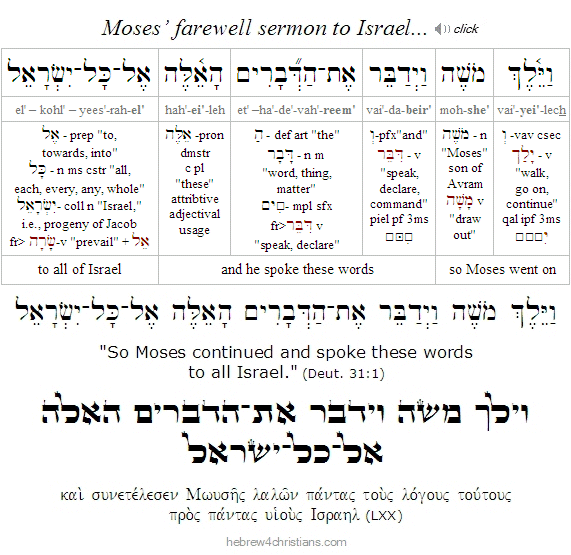 |
Shavuah Tov Podcast:
Parashat Vayeilech..
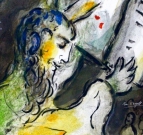
09.22.24 (Elul 19, 5784) In this "Shavuah Tov" audio broadcast I discuss both the Jewish High Holidays -- and how they relate to us as followers of Yeshua the Messiah -- as well as the weekly Torah portion we will read for Shabbat Shuvah, namely parashat Vayeilech. I hope you will find it helpful. L'Shanah Tovah u'Metukah b'Yeshua Meshicheinu, chaverim! - "to a good and sweet year in our Messiah Yeshua, friends."
Parashat Nitzavim:
Standing before God...

09.22.24 (Elul 19, 5784) Shalom kulam! For the last Sabbath of the current Jewish (civil) year we have a "double portion" of Torah. Our first Torah portion, called parashat Nitzavim (פרשת ניצבים), is always read on the Sabbath before Rosh Hashanah, serving as a prelude to the holiday. The sages found an allusion to Rosh Hashanah in the opening verse: "You are standing (נִצָּבִים) today all of you before the LORD your God" (Deut. 29:10), where "today" refers to Rosh Hashanah (i.e., Yom Teruah), when "all of you" shall stand before the LORD your God in judgment. The "last" shofar blast refers to Rosh Hashanah when the dead shall be raised (Rosh Hashanah 16b), whereas the "great" shofar blast is sounded at the end of Yom Kippur, after Israel has received the atonement.
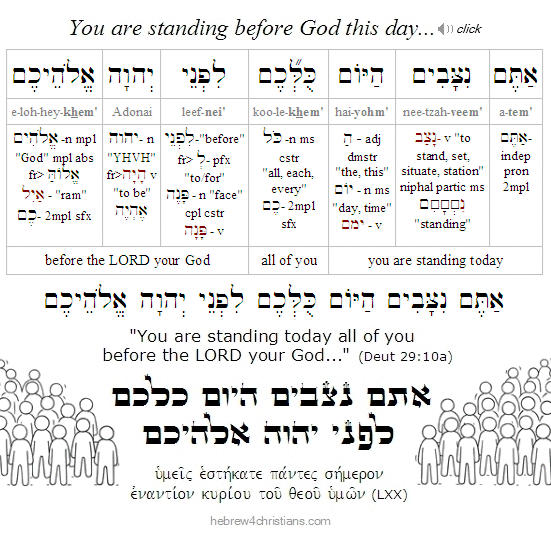 |
According to many of the sages, the time immediately preceding the appearance of the Messiah will be a time of testing (nisayon) in which the world will undergo various forms of tribulation called chevlei Mashiach (חֶבְלֵי הַמָּשִׁיחַ) - the "birth pangs of the Messiah" (Sanhedrin 98a; Ketubot, Bereshit Rabbah 42:4, Matt. 24:8). Some say the birth pangs are to last for 70 years, with the last 7 years being the most intense period of tribulation -- called the "Time of Jacob's Trouble" / עֵת־צָרָה הִיא לְיַעֲקב (Jer. 30:7). The climax of the Great Tribulation is called the great "Day of the LORD" (יוֹם־יהוה הַגָּדוֹל) which represents God's wrath poured out upon a rebellious world system. On this fateful day, the LORD will terribly shake the entire earth (Isa. 2:19) and worldwide catastrophes will occur. "For the great day of their wrath has come, and who can stand?" (Rev. 6:17). The prophet Malachi likewise says: "Surely the day is coming; it will burn like a furnace. All the arrogant and every evildoer will be stubble, and that day that is coming will set them on fire,' says the LORD Almighty. 'Not a root or a branch will be left to them'" (Mal. 4:1). Only after the nations of the world have been judged will the kingdom of God (מַלְכוּת הָאֱלהִים) be established upon the earth. The remnant of Israel will be saved and the 1,000 year reign of King Messiah will then commence (Rev. 20:4).
Shavuah Tov Podcast:
Parashat Nitzavim..
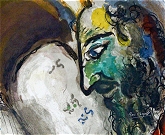
09.03.23 (Elul 17, 5783) As mentioned above, our Torah reading this week, parashat Nitzavim (פרשת ניצבים), is always read on the Shabbat immediately before the solemn holiday of Rosh Hashanah, and therefore it is the last portion read before the new Jewish year (see Exod. 23:16). In many synagogues, the opening and concluding paragraphs of parashat Nitzavim are also read during the Yom Kippur morning service.
Torah portion Nitzavim begins: "You are standing here today, all of you, before the LORD your God (אַתֶּם נִצָּבִים הַיּוֹם כֻּלְּכֶם לִפְנֵי יְהוָה אֱלהֵיכֶם) ... so that you may enter into the sworn covenant of the LORD your God, which the LORD your God is making with you today, that he may establish you today as his people, and that he may be your God, as he promised you, and as he swore to your fathers, to Abraham, to Isaac, and to Jacob" (Deut. 29:10-13). After affirming the congregation, Moses went on to review Israel's history and prophetic future -- i.e., the great prophecy of the Diaspora and Return of the people -- and then he solemnly appealed for all those who believed to turn to the LORD for life: "I call heaven and earth to witness against you today, that I have set before you life and death, blessing and curse. Therefore choose life, that you and your offspring may live" (Deut. 30:19).
In addition to an overview of the reading, I discuss the fall holidays of the Torah's calendar, particularly the significance of Rosh Hashanah for followers of Yeshua the Messiah.
Fearing No Evil...
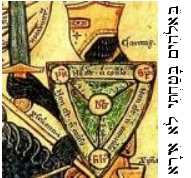
[ "What else does anxiety about the future bring you but sorrow upon sorrow?" - Kempis ]
09.20.24 (Elul 17, 5784) The devil wants you to be afraid, to be very afraid, and indeed, inciting fear is the primary weapon he uses against us... The devil understands that fear profoundly affects the way the human brain processes images and messages: Fear colors the way we see and hear things. Fear makes us feel angry, unsettled, and unhappy. And since the mind and body are intricately interconnected, fear is the root cause of many physiological problems such as heart disease, high blood pressure, clinical depression, and other ailments. Left unchecked, fear can be deadly...
Most of our negative emotions come from fearful thoughts, including anger, frustration, and rage. On a spiritual level, fear and worry can cause people to question God's love, to doubt His promises, and so on. The devil knows that frightening people causes them to be unsettled, off-balance, and therefore vulnerable to all sorts of sickness, manipulation, and deception. Living in fear is a form of slavery (Heb. 2:15).
Logicians call illegitimate appeals to fear argumentum ad baculum, or the "appeal to the stick." When someone plays on your fears, it is wise to discern whether there is any basis in reality for the supposed threat, or if the appeal is simply a rhetorical scare tactic intended to persuade (coerce) you to accept some sort of conclusion. Unscrupulous people such as advertisers, politicians, dictators, community organizers, social activists, and so on, regularly use fear to manipulate public opinion, of course, and they are only too glad to tell you exactly what you should fear. They are delighted to prey upon your anxieties and then offer you their supposed "remedy." You know whom they serve, friends...
The war for truth began in the Garden of Eden, when Satan lied to Eve by saying that she would not die if she disobeyed God (Gen. 3:4). Satan cunningly played on Eve's fear of being deceived to persuade her to disobey. Fear, then, is the emotional center of sin and the opposite of faith. The fearful are referred to as the "unbelieving" and those who "love and make a lie" (Rev. 21:8, 22:15).
God repeatedly tells us not to be afraid – not of man, nor of war, nor of tribulation, nor of various plagues, yea, nor even of death itself (Rom. 8:35-39). Indeed, one of the most frequently occurring commandments in Scripture is simply al-tirah, "Be not afraid."
But how do we overcome our fear? How can we live our faith in the midst of a worldwide cultural slide into deception and insanity? How can we walk in peace while a worldwide tyranny is crafting a globalist police state wherein no one will be able to buy or sell if they are not wholly subservient to the dictates of an unseen power elite? How else but by wholeheartedly trusting that God is with us? The LORD will never leave nor forsake us, even if we are faced with difficult circumstances. The antidote to fear is heartfelt faith in God's love for us (1 John 4:18). God saves us from our fears (Psalm 34:4, 2 Tim. 1:7). When we trust that God personally cares for us, we find comfort and courage to face life without fear.
Hebrew Lesson
Psalm 23:4a Hebrew reading (click):
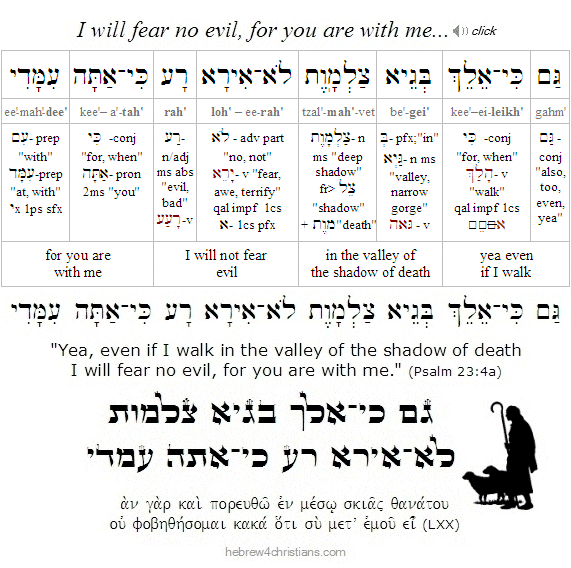 |
Note: Ours is an age of emotional incontinence and unbridled thinking. We need self-control of the mind and heart... we need to "take every thought captive" to the abiding Presence of the LORD. May God grant each of us the grace of the Holy Spirit to walk in the shalom of His sheltering love. Amen.
Firstfruits and Blessing...
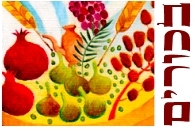
[ "If the only prayer you said was thank you, that would be enough." ― Meister Eckhart ]
09.20.24 (Elul 17, 5784) From our Torah portion this week (Ki Tavo) we read: "You shall take some of the first of all the fruit of the ground, which you harvest from your land that the LORD your God is giving you, and you shall put it in a basket, and you shall go to the place that the LORD your God will choose, to make his name to dwell there" (Deut. 26:2). This is called the mitzvah of "bikkurim" (בִּכּוּרִים), or "firstfruits," a thank offering (זֶבַח הַתּוֹדָה) that was given to the priests in recognition of God's faithful love.
In a special Shavuot ceremony, a basket filled with the first samples of the spring harvest was presented before the altar at the Temple as the worshiper recited a passage from Torah (Deut. 26:5-12) that retold the basic story of Exodus from Egypt and how the LORD had faithfully brought the people into the Promised Land, "a land flowing with milk and honey" (i.e., eretz zavat chalav u'devash). The point of the yearly bikkurim ritual was to instill a sense of gratitude, or "hakarat tovah" (הַכָּרַת טוֹבָה), a phrase that means "recognizing or being conscious of the good" (indeed, the word "Jew" (יְהוּדִי) comes from wordplay on the verb yadah (יָדָה), meaning to acknowledge and give thanks).
We see that the firstfruits offering teaches us to use the "good eye" to appreciate God's kindness and love. Doing so will yield a harvest of blessing in our lives, as it says: "Honor the LORD with your substance and with the firstfruits of all your produce; then your barns will be filled with plenty, and your vats will be bursting with wine" (Prov. 3:9-10). "Bless the LORD, O my soul, and all that is within me, bless his holy name; Bless the LORD, O my soul, and forget not all his benefits" (Psalm 103:1-2).
בָּרֲכִי נַפְשִׁי אֶת־יְהוָה
וְכָל־קְרָבַי אֶת־שֵׁם קָדְשׁוֹ
bah·ra·khee · naf·shee · et-Adonai
ve·khol-ke·rah·vai · et-shem · kohd·shoh

"Bless the LORD, O my soul,
and all that is within me, bless his holy name"
(Psalm 103:1)

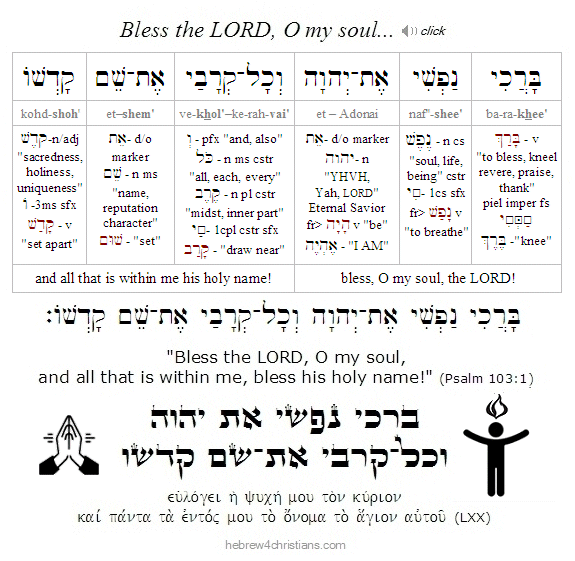
The bikkurim ritual testifies that God has redeemed us so that we will produce fruit in our lives to His glory (John 15:7-8). Shabbat shalom and love to you, chaverim...
Seeing beyond the Seen...

[ "A little faith will bring your soul to heaven, but a lot of faith will bring heaven to your soul." - Dwight L. Moody ]
09.20.24 (Elul 17, 5784) Yeshua told us: "Blessed are those who have not seen and yet have believed" (John 20:29). Despite the struggle of this life - our sorrows, pains, and even death itself - we believe in God's love and promise for us, even if we do not presently see the fulfillment of our hope, just as Abraham believed the promise that he would be the father of an innumerable multitude long before he saw any sign of its fulfillment.
Abraham "believed the impossible" and "hoped against hope" (παρ᾽ ἐλπίδα ἐπ᾽ ἐλπίδι), meaning that hope kindled within him even though there was nothing to see in the realm of the natural -- he believed in an unseen good; he trusted in the One who gives life to the dead and who "calls into existence the things that do not exist" (Rom. 4:17). The Scripture comments: "He did not weaken in faith when he considered his own body, which was as good as dead (since he was about a hundred years old), or when he considered the deadness of Sarah's womb. He did not stumble over the promise of God through unbelief but was strong in faith, and gave glory to God, fully persuaded that God was able to do what he promised, and that is why his faith was counted to him as righteousness" (Rom. 4:19-22).
Likewise we are called to believe in an unseen good, an unimaginably wonderful destiny for our lives, as it says, "Things no eye has seen, nor ear heard, nor mind imagined, are the things God has prepared for those who love him" (1 Cor. 2:9). Faith does not use natural reason or the evidence of the senses to see the unseen, but it "believes to see" through "eyes of the heart" to know the hope of God's calling and to attain the blessing (Eph. 1:18). Faith in God's love comes from a different source and has a different means of apprehension than human wisdom, so that no matter how things might appear in this fallen world, the LORD God may be known and trusted to work all things for our ultimate good. "Blessed are those who have not seen and yet have believed." Amen.
Hebrew Lesson
Psalm 25:1-2 reading (click for audio):
Exile and Joy...
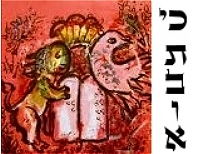
[ "True faith rests upon the character of God and asks no further proof than the moral perfections of the One who cannot lie. It is enough that God has said it." - A.W. Tozer ]
09.19.24 (Elul 16, 5784) In our Torah portion this week (Ki Tavo) we are warned of exile if we fail to express simchah (joy) for the fruit of our lives (see Deut. 28:45-47). We are to offer our bikkurim (first fruits) from an inward store of gratitude, from a heart that recounts the history of God's deliverance (Deut. 26:1-11). We don't superficially enter into the land. Instead of attaining joy by keeping the commandments, we keep the commandments by attaining joy, which is another way of saying that faith is the essence of all true Torah. "If we do not fulfill a mitzvah with joy, we do not understand the meaning of a mitzvah." Indeed, without faith it is impossible to please God (Heb. 11:6).
A Chassidic story, undoubtedly influenced by the New Testament, says that Rabbi Shmelke and Rabbi Moshe Leib of Sassov were traveling on a ship when a dangerous storm arose that threatened to destroy the vessel. Rabbi Shmelke went over to the Sassover and saw that he was engaged in a joyful dance. "Why are you dancing?" asked Shmelke. "I am overjoyed at the thought that I shall soon arrive in the mansion of my Father." "I shall join you, then," said Shmelke. But the storm spent its force, and the ship reached port in safety.
Inner joy comes from entirely trusting that God loves, forgives, and accepts you... Joy and peace spontaneously arise when you realize that God knows your "story" and promises you a "happy ending." It is faith in God's personal love for you...
Faith sees beyond the fleeting to the substance, that is, the reality of the promise; it is the conviction of the coming blessing as foretold by God. We come to God by trusting that this reality is forthcoming, and by doing so we contemn the vanity and deceptions of the godless world. We confess that we are "strangers" and "sojourners" on this earth, "tent dwellers" who look for a city with "everlasting foundations" whose builder and maker is God. This coming blessing is the "heavenly Jerusalem," the joyful assembly of myriad angels and the "called out" people of faith whose names are written in heaven, and whose spirits have been perfected by divine transformation of their resurrection. It is to behold the presence of Yeshua himself, the mediator of the true covenant (διαθήκης νέας) of the Living God. This the vision of Zion, the perfection of holiness, and of our ultimate healing and blessedness. Let us, therefore, endure in joy, "seeing Him who is invisible," as we faithfully await the coming day when we shall take hold of the unspeakably glory and the reward of our faith!
Hebrew Lesson
Psalm 27:14 reading (click for audio):
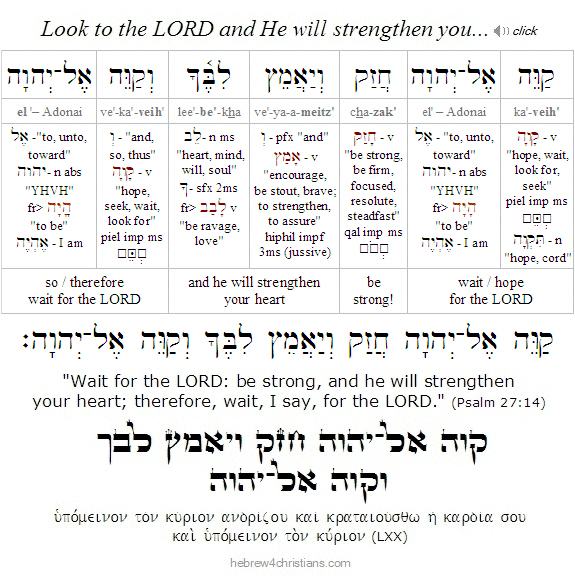 |
The Exigencies of Repentance...
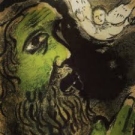
[ "Die before you die; there is no chance after." - C.S. Lewis ]
09.19.24 (Elul 16, 5784) In the Gospel of Luke we read that some people once came to Yeshua to share the terrible news that Pontius Pilate, the infamous Roman prefect of Judea, had murdered several Jews from Galilee as they were offering sacrifices at the Temple (Luke 13:1). Apparently Pilate even mingled the blood of these Galileans with their offerings! Horrible. Dreadful. How could this have happened? Why would God allow such a thing?
We are unsure why these people might have shared this awful news with Yeshua. Were they testing him? Perhaps they hoped he would openly identify with the Zealots who sought to overthrow the Romans, or perhaps they wanted him to say that the Galileans deserved retribution for some sort of wickedness -- or perhaps they just shared out of morbid concern -- but regardless of their motive, Yeshua replied by asking them a question: "Do you think these Galileans were worse sinners than all the other Galileans, because they suffered these things?" And then he added: "I tell you, no; but unless you repent you will all likewise perish" (Luke 13:2-3).
Now that was unexpected. Why did he say that the same sort of fate might befall them? Yet to reiterate his point, Yeshua recalled the sudden death of several people when the Tower of Siloam fell: "Those eighteen who were killed when the tower in Siloam fell on them, do you think they were worse offenders than all the others who live in Jerusalem? I tell you, no; but unless you repent you will all likewise perish" (Luke 13:4-5). There's no mention of the reaction of the people when Yeshua said this, but it was likely one of shock, anger, and fear.
What was Yeshua trying to teach by his response to these tragedies? Was he being cruel to point out that unless people repent, they would suffer tragedy in their lives? Well first it is likely that he was countering the assumptions behind the thinking of his listeners, namely, the idea that unexpected death happens only to people who are notoriously bad and therefore deserve judgment from heaven. On the contrary, trouble often befalls the righteous, while worldly success and comforts often are gained by the wicked. Yeshua therefore rejects simplistic answers as to why death happens, and he instead consigns tragedies, suffering, and trouble to be an inescapable part of life in a broken and fallen world. Death is the inheritance of all the children of Adam, and humanity is under the divine curse until it would be removed by the atonement of the Yeshua upon the altar of the cross (Gal. 3:13). If there is a deeper reason as to why particular tragedies occur, we are not privy to such information. Yeshua, however, warns us from thinking that some people deserve judgment more than others, but on the contrary, that all people are sinners in need of salvation (Rom. 3:23).
The lethal consequence of the fall of Adam extends beyond acts of human sinfulness, to natural disasters and matters of sickness, disability, and physical death, however. For example, when the disciples encountered a man who had been born blind they asked Yeshua: "Rabbi, why was this man born blind? Was it because of his own sins or his parents' sins?" Yeshua then answered: "It was not that this man sinned, or his parents, but that the works of God might be manifest in him" (John 9:1-3). Though we naturally assume that there must be a reason for whatever happens, we are not given explicit explanations, and therefore we should be cautious when making inferences. It is a matter of trust that God will bring about a wonderful end for us -- even if we presently may experience pain, sorrow, and various kinds of suffering in our lives. That's part of the consummation of our redemption, after all. However, it is written: "We must through much tribulation enter into the kingdom of God" (Acts 14:22) and "Unless a grain of wheat falls into the earth and dies, it remains alone; but if it dies, it bears much fruit" (John 12:24). We are both redeemed people but we live within fallenness...
Sadly people often die with little warning and for no clearly identified reason. Life is precarious, fragile, and poignant. Yeshua does not defend God's governance of the universe; he knows His heavenly Father is loving, just, and righteous in all his ways. He groans over our suffering and indeed tastes death for every one. He was born to die. "My God, my God, why have you forsaken me?" was his cry on the cross, in the hour of his abandonment and utmost grief. Yeshua entered in the depths of our sin and embraced it as his concern and passion to remedy on our behalf. He was alone in the dark cloud to intecede for us...
In light of the unpredictable perils of life, then, Yeshua wants all people to understand their great need for teshuvah, or repentance. This was the burden of his ministry to us, the very reason he came. And indeed teshuvah is first word of his proclamation: "The time is fulfilled, and the kingdom of God is at hand. Repent, and believe in the gospel" (Mark 1:15). Yeshua wants everyone to know their need and his power to save them from death...
The central problem for human beings - both the so-called good as well as the bad - is that of spiritual death, that is, the destruction of one's soul. The danger is real for all of us. Each of us may be unprepared for sudden death, and therefore it is vital to turn to God for life while we have the opportunity. We must be wary of a false sense of security; we must understand our radical need for healing and turn to God for salvation. Time is running out. Our days are numbered. We must sincerely repent lest we perish in uncertainty and darkness of heart...
But this is not all. Yeshua continued his teaching about the danger of perishing without repenting by giving the "parable of the fig tree" (Luke 13:6-9). A certain man had a fig tree in his vineyard that did not bear fruit. When he decided to cut the tree down, his gardener intervened: "Sir, give it one more chance; leave it another year, and I'll give it special attention and plenty of fertilizer. Then if it bears fruit next year, well and good; but if not, you can cut it down." Among other things this parable teaches that a tree that is fruitless will eventually be destroyed, echoing John the Baptist's warning to turn to the Savior for life: "Even now the ax of God's judgment is poised, ready to sever the roots of the trees. Yes, every tree that does not produce good fruit will be chopped down and thrown into the fire!" (Matt. 3:10). The fruit here is that of teshuvah, or repentance (Luke 3:8). The "fruits worthy of repentance" are those derived from heartfelt trust in God's salvation, resulting in a radical change of direction, an abiding abhorrence over personal sin, and an earnest turning to God to escape from the wrath to come - the wrath that is ready to break forth in fiery judgment upon the earth. True repentance is a change of mind (μετάνοια), "taking down high thoughts and bringing them into obedience to Christ" (2 Cor. 10:5). The parable teaches that a life devoid of teshuvah, and in particular a soul devoid of faith in Yeshua as the Savior and deliverer of the soul, will be unprepared for death. The gardener is patient and does everything he can to rescue the tree, but if the tree continues to be fruitless, it will be removed suddenly and irrevocably. The point of the parable is a great question. Will fruit emerge in time before the tree would be felled in judgment? How much time remains for the tree before its day of reckoning comes?
Why does God want us to face the truth about death? Why does Moses ask God to teach us to "number of our days?" (Psalm 90:12). Why does David pray: "LORD, make me to know mine end, and the measure of my days, what it is; that I may know how frail I am" (Psalm 39:4)? The reason is that by nature people deny the reality of death - they hide their eyes from it, ignore it, and pretend it's not there - so they can continue to live under the illusion that they are in control of their lives, that they are the center, that they are immortal little "gods." Death threatens the ego and humbles us to confess the truth about life, namely that we are not in control, that we cannot choose to be immortals, that we do not have power to exist in ourselves, and therefore we need life from a different source - spiritual life - wherein we receive a new identity and a new being found in relation to God.
So in light of all this, what can we learn about repentance? Far more than moral reformation or "self-improvement," the word teshuvah means turning to God in our brokenness, regretting the sin of our life, and fundamentally changing the way we think. Most of all it means trusting in God, believing in the miracle of resurrection life, and relying upon his promises despite the transience, jeopardy, and uncertainty of our lives in this world. Repentance is the confession of our fragility and of our need for God to carry us through the darkness into the presence of his glorious light; it means finding faith to be healed from the sickness of spiritual death and to exist as a new creation for God's glory. It believes that one day we will be home in the house of God's unending love... Repentance is a heart that won't let go of God's love.
Hebrew Lesson
Psalm 39:4 Hebrew reading (click):
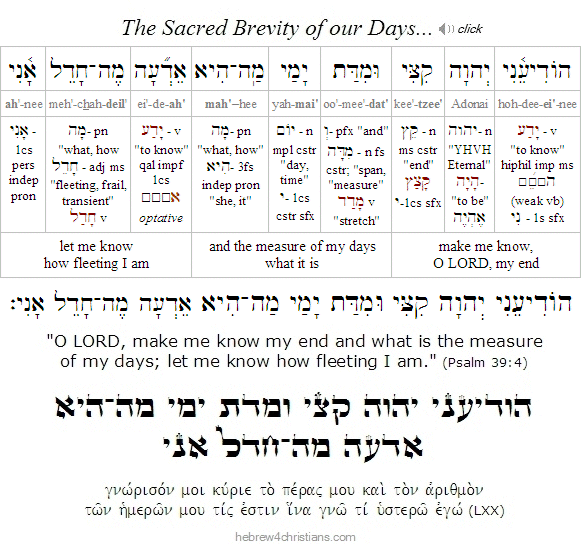 |
Blessing of Willingness...
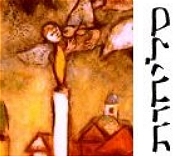
[ "Let me seek you in the darkness of my silence, and find you in the silence of Your light, which is love shining as the sun, flowing like the river, and joying like the heart." - Meister Eckhart ]
09.19.24 (Elul 16, 5784) When King David repented from his sin and asked God's forgiveness, he appealed to the LORD: "Restore me to the joy of your salvation (יְשׁוּעָה) and sustain me with a willing spirit. Then I will teach transgressors your ways, and sinners will return to you" (Psalm 51:12-13). The sages comment that this is indeed the way of the LORD (דֶּרֶךְ יְהוָה), namely, to confess your sin, and in brokenness and heartfelt contrition, to return to the LORD full of hope in his steadfast love. In this way, sinners will understand the truth of Torah and return to the LORD God as well.... Hashiveinu, Adonai.
In the Torah we read: "if you seek for the LORD your God from there (i.e., in your place of exile), you will find him, if you search for him with all your heart (בְּכָל־לְבָבְךָ) and with all your soul" (Deut. 4:29). From where do we search, from what place, except from a place of hardship, testing, and tribulation? If you seek for the LORD your God from there - in the midst of your exile, in the midst of your heart's cry - you will find him there, in your heart. This message is a prophecy to the heart of faith, so that even after testing befalls you, in the end you will belong to the LORD and will hear his voice. Amen. Have faith in God to heal.
Hebrew Lesson
Psalm 51:12 reading (click):
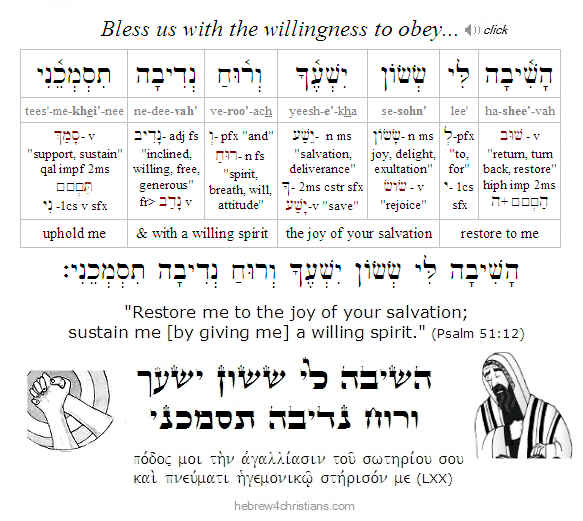 |
Repent one day before you die...
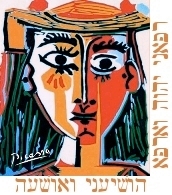
[ "Rabbi Eliezer said: 'Let the honor of your friend be as dear to you as your own; And be not easily provoked to anger; And repent one day before your death.'" - Pirkei Avot 2:10 ]
09.19.24 (Elul 16, 5784) In this week's Torah reading (Ki Tavo), the LORD commanded that the firstfruits (bikkurim) of crops be brought to the priests in the central sanctuary in a prescribed ritual. This celebration later was associated with the festival of Shavuot ("Pentecost") and is traditionally recalled during our Passover Seders.
Each family would go up to Jerusalem to present a basket of their finest fruits to a kohen (priest), who then would wave it in seven directions (tenufah) and set it before the altar. The worshipper would then recite a ceremonial vidui (confession) before the priest that began, "A wandering Aramean was my father." Some of the sages understand this opening phrase to mean: "An Aramean destroyed my father," based on the the verb oved (אבד) that alludes to devastation (the word Abaddon comes from the same root). So understood, this confession thanks God not only for Israel's deliverance from bondage in Egypt, but also from the evil designs of Laban who sought to kill Jacob when he left for the Promised Land. The sages reasoned that "Uncle Laban" was at heart an enemy of God who literally sought to kidnap the sons of Israel (Gen. 31:43).
Though this portion begins with a joyful subject that celebrates God's faithfulness, it also includes a litany of curses (kelalot) proclaimed for those who stray away from the truth of Torah. The frightening list of curses is summed up in Deut. 28:45-48:
All these curses shall come upon you and pursue you and overtake you till you are destroyed, because you did not obey the voice of the LORD your God, to keep his commandments and his statutes that he commanded you. They shall be a sign and a wonder against you and your offspring forever. Because you did not serve the LORD your God with joyfulness and gladness of heart, because of the abundance of all things, therefore you shall serve your enemies whom the LORD will send against you, in hunger and thirst, in nakedness, and lacking everything. And he will put a yoke of iron on your neck until he has destroyed you.
Notice something profoundly important here: All the varied and distressing curses enumerated in this Torah portion would come upon those who refused to serve the LORD "with joy (simchah, שִׂמְחָה) and gladness of heart." In other words, living a discontented and ungrateful life leads to greater and greater rebellion. Genuine joy is heartfelt appreciation at the wonder and grace of God. Indeed, the Greek word for joy (χαρα) is related to the word for grace (χαρις), so there is a deep inner connection between grace and joy (Phil. 4:4). The joy of the LORD is our strength (Neh. 8:10).
The sages connect the joy of offering first fruits with the study of Torah, since the phrase "You shall take from the first" (Deut. 26:2) alludes to the Torah, which is the first part of our wisdom (Psalm 111:10). In the world to come, the first thing you will be asked is if you had learned the wisdom and truth of Torah.... "Blessed ("happy") is the man who...delights in the Torah of the LORD and meditates upon it day and night" (Psalm 1:1-2). If you find studying and living the truth of Scripture joyless, then be careful that you don't drift into spiritual exile.
Why is this portion of Torah always read during the Season of Teshuvah (i.e., Repentance)? Because the blessings and curses are intended to awaken us to perform "soul searching (cheshbon ha-nefesh, חֶשְׁבּוֹן הַנֶּפֶשׁ) and teshuvah. The Talmud says, "Repent one day before you die." But who knows the day of one's death in advance? Therefore live each day as if it were to be your last, and live it with joy.
Shuvah! Return to the LORD and serve Him with gladness (Psalm 100:2). Come in joy of what Yeshua, our Firstfruit of the LORD (1 Cor. 15:20), has done for you: "Though you have not seen him, you love him. Though you do not now see him, you believe in him and rejoice with joy that is inexpressible and filled with glory, obtaining the outcome of your faith, the salvation of your souls" (1 Pet. 1:8-9).
Hebrew Lesson
Lamentations 5:21 reading (click):
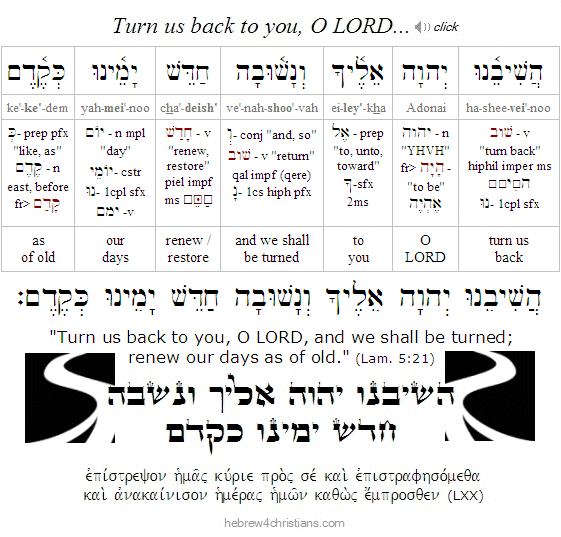 |
The End of Brokenness...
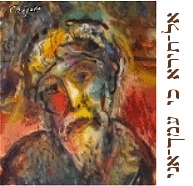
[ The following is related to the month of Elul and the "Season of Repentance"... ]
09.18.24 (Elul 15, 5784) Spirituality is lived now, in this world... "I do not ask that you take them out of the world, but that you keep them from the evil one" (John 17:15). We are "in but not of" the world; we are part yet also not part of it... This is the tension of living in the realm of the "already-not-yet." We are haunted by a sense of incompletion - a yearning for the fulfillment of our salvation, an inner ache that helps focus the heart's affections...
A paradox of the spiritual life is that we must descend to ascend... We all sin; we all fall short. First we must accept our own "dark side" -- our own sinful nature -- before we can ever come to know the light... This is the path of confession - acknowledging the truth about who we really are, which is the only way we can learn to "endure ourselves" and eventually let go of our shame. We find ourselves when we give up our defenses and take hold of God's compassion. We all have our sins; now we must find our courage in God's love.
כִּי־פְשָׁעַי אֲנִי אֵדָע
וְחַטָּאתִי נֶגְדִּי תָמִיד
kee-fe·shah·ai · a·nee · ei·dah
ve·cha·tah·tee · neg·dee · ta·meed

"For I know my transgressions,
and my sin is ever before me"
(Psalm 51:3)
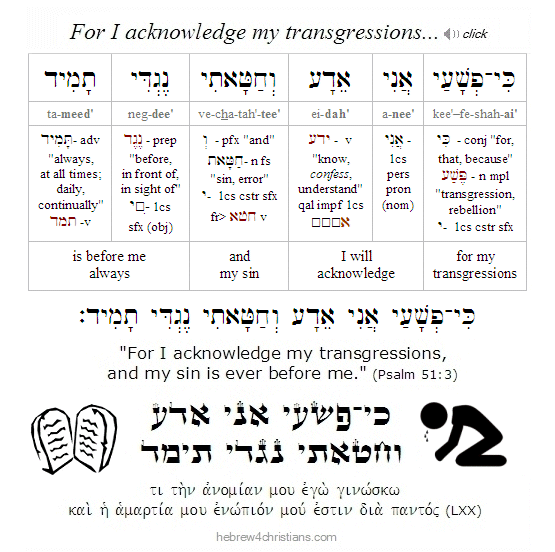
We must learn to "endure ourselves..." We can't deny who we are; we can't pretend to be what we are not. The root of shame is self-rejection. This is the hidden anguish of heart that leads many of us astray. As Henri Nouwen said, "There are two extremes to avoid: 1) being completely absorbed in your pain and 2) being distracted by so many things that you stay far away from the wound you want to heal." We don't come to the cross to destroy ourselves but to find deliverance and life: our brokenness is a means to this greater end. We "take up the cross daily," which means learning to forgive and endure ourselves... As theologian Paul Tillich once insightfully said: "The courage to be is the courage to accept oneself as accepted in spite of being unacceptable..." (Tillich).
In this age, we are part of a seemingly endless journey of falling down and getting back up once again. It is this struggle, this "good fight of faith," that eventually ennobles the heart and establishes character... In light of this, we must refuse to lose heart when things appear to be going badly, and likewise we must remain vigilant when things seems to be going well. The goal of the process is always to be in heartfelt, genuine, and earnest relationship with the LORD. As Madame Guyon once wrote, "You are born into the world like an illegitimate child who has no idea who his father is. But God comes and draws you out of your old life. He cleanses you and gives you back your innocence." Amen.
 |
Being Chosen and Beloved...

[ "The truth, even though I cannot feel it right now, is that I am a chosen child of God, precious in God's eyes, called the Beloved from all eternity and held safe in an everlasting embrace. We must dare to opt consciously for our chosenness and not allow our emotions, feelings, or passions to seduce us into self-rejection." - Henri Nouwen ]
09.18.24 (Elul 15, 5784) In his commentary of the Torah, the late Yeshayahu Leibowitz said that a passage from Ki Tavo provides a key for understanding the relationship between God and Israel: "You have avowed (אמר) this day that the LORD is your God, and that you will walk in His ways and keep His statutes, His commandments, and His judgments, and that you will obey His voice. And today the LORD has avowed to you (אמר) to be his treasured people (am segulah: עַם סְגֻלָּה), as he has promised you, so you may keep all his commandments" (Deut. 26:17-18). The key verb here, "amar" (אמר), means to "say" but in the "hiphil perfect" form it means to solemnly declare, as words of promise between a bridegroom and his bride: harei at mekudeshet li - "behold, you are betrothed to me."
But does the choice to obey (i.e., love) God move him to call us his people, or is it the other way around, does God choose us so that we may know him as our own? Doesn't the Scripture say that "we love Him because He first loved us" (1 John 4:19)? Yes of course the Sovereign LORD takes the initiative. We cannot know him apart from his disclosure to us. We are "elected" or "called out" to be his people (Rom. 9:10-12). Unless the Spirit of God breathes upon us, we are as lifeless as stone, unable to respond. It is God's work that gives us life and saves us, not our own; "salvation is of the LORD" לַיהוָה הַיְשׁוּעָה
The existential connection between God and his people is based on the mutual promise and acceptance that we are God's people. From our point of view, we choose the LORD to be our God by keeping his commandments and obeying his voice, but from God's point of view, we are chosen because we are willing to love and obey him. The fact that you solemnly confess faith in the Lord and accept him as your God reveals the truth that God has chosen you to be his own particular segulah (סגוּלה). The LORD calls you to love and honor him not because of what he does for you but for who he is - which then reveals who you are in relation to him. The obligation to serve God -- to "show up" and affirm who he is, validates the truth about who we are as his beloved people.
Yeshua said, "according to your faith be it done unto you." The first of the ten commandments is to accept that the LORD is your God, to believe that he cares for you and that you are beloved by him. It is your teshuvah, your turning to receive the love of God, that establishes that you are indeed his beloved.
Hebrew Lesson
Deut. 7:6b reading (click for audio):
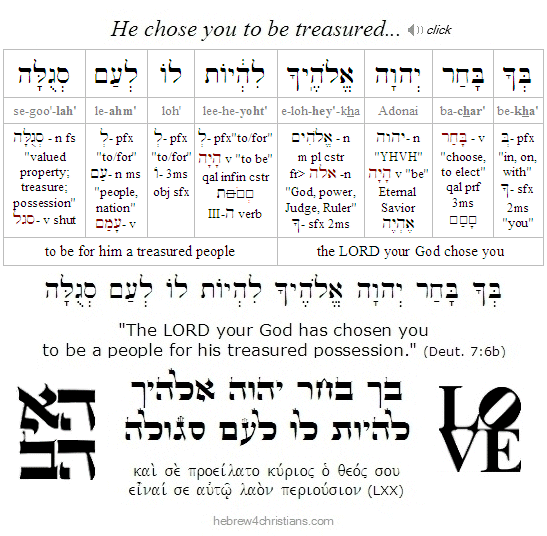 |
Teshuvah of Humility....
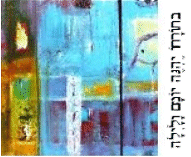
09.17.24 (Elul 14, 5784) Only Yeshua imparts eternal life to the trusting soul, enabling the heart to truly and radically change. However, to receive this utmost blessing, we must settle the question of our profound need for deliverance from our corrupt inner nature. We simply cannot hear the message of the gospel if we do not feel hopelessly trapped within the consciousness and conviction of our sin. If we believe that we must justify our own existence by means doing good or by means of religious practices, for example, we will likely turn against God by regarding him a taskmaster who demands too much from us. If however, we realize that we cannot please God apart from his merciful intervention in our hearts, we learn to let go and abandon ourselves to his mercies. Those who cannot fathom the grace of God, however, are consigned to go back "under the law" again and again until the question of their powerlessness is settled. Until that miraculous moment of awakening comes, however, the message of Yeshua will make little traction within the heart.
Grace often comes in disguise because the ego has to be humbled for the heart to confess its need. When the veil is pulled back, and we discover with a shock that we ourselves are evil, and that despite our ideals we need deliverance from our inner wretchedness, we begin to turn to God not merely for mercy, but for the miracle of transformation - a new kind of life, a new heart, a new spirit - freedom from the soul sickness that haunts us in our secret shame and self reproach.... It is when we are at the "end of ourselves" -- when we know in our bones that we must "find God or die" -- that we can turn to Yeshua for life.
It is hard for the "rich" to enter the kingdom of God; it is hard for those who are self-satisfied, who regard themselves as moral, righteous, and who pray: "Thank you God that I am not like other men" (Luke 18:11). Yeshua speaks to the "poor in spirit" and to those who mourn over their lost condition. Those who are blessed realize their great need for God's intervention in their lives. They understand that it is in brokenness that we find divine healing; it is in our weakness we find God's strength.
Hebrew Lesson
Psalm 34:18 Hebrew reading (click):
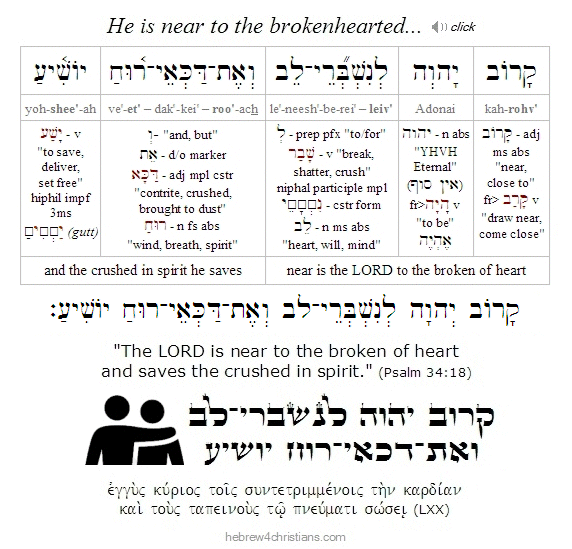 |
"God became a man to turn creatures into sons, not simply to produce better men of the old kind but to produce a new kind of man. It is not like teaching a horse to jump better and better, but like turning a horse into a winged creature" (Lewis: Mere Christianity). Amen. The divine name associated with teshuvah, or repentance, is ehyeh (אהיה), "I will be." The LORD imparts a holy and divine nature within us when are are reborn as his children. As it is written in our Scriptures: "Therefore, if anyone is in Messiah, he is a new creation (בריאה חדשׁה); the old has passed away; behold, the new has come" (2 Cor. 5:17).
Teshuvah and Healing...

[ Left to our own devices, we can't deal with the evil influences of this fallen world nor handle the raging impulses and fears of our own sinful nature. Confess your need for God to fight for you, to shine his light in your darkness. Yeshua has conquered sin and death on the cross and now intercedes for you; therefore call upon his name for life - even if you want to scream out and cry! The LORD has promised to never leave nor forsake those who honestly seek him... ]
09.17.24 (Elul 14, 5784) "Those who are well have no need of a physician, but those who are sick. I have not come to call the righteous but sinners to repentance" (Luke 5:31-32). Every one of us has a "dark side" or a "shadow self" that has destructive and selfish urges. We try to conceal this truth from others (and even ourselves) but such denial doesn't change the reality within our hearts (Matt. 5:19; Jer. 17:9; Eccl. 9:3). Indeed, when we pretend to be something we are not we are more likely to be overwhelmed by dark forces hidden within us. Paradoxically we most vulnerable when we think we are well, that is, when we deny our sickness our heart and minimize our need for deliverance.
The way of healing is to "own" or confess the truth of our inner condition and to acknowledge the dark passions that sometimes overmaster our best intentions. We must give ourselves permission to allow the hurt, angry, and fearful voices to be heard and sanctioned within us - and then to bring these dark and hidden aspects of our selves before God for healing. The failure to do so will split the soul and cause the hidden aspects of the self to seek "revenge" upon the "parent self" that censors their message. The struggle within our hearts is real and we should attend to it seriously. Denying evil by pretending that we are okay, or by blaming others, blinds us to the truth of our ongoing need for deliverance. May God help each of us to be honest with ourselves and to confess our great need before our Heavenly Father.
Why do we have such difficulty being genuinely honest with ourselves? Despite the fact that we may profess that we are "sinners saved by grace," we often make excuses for our failures, rationalizing that we are not "that bad," and therefore we postpone genuine teshuvah (repentance) and trifle with our spiritual lives. We do this because we feel an almost irresistible desire or "need" to justify ourselves, to "save face" by pretending that we are not "incurably sick," or by attempting to find something about us that makes feel valuable and worthy. As H.L. Mencken once wittingly noted, "the 'truth' that survives is simply the lie that is pleasantest to believe."
The LORD wants us to be truthful in the "inward being" (Psalm 51:6), though that truth will cost us something, namely whatever worldly gains we might find through self-deception... Opening our hearts to divine examination eventually means colliding with the world of men and their conspiracies, since the godly man no longer abides their presence (Psalm 1:1-2). The Apostle Paul said there was an exclusive disjunction between seeking the approval of men and of the approval of God: "Do I seek to please men? for if I yet pleased men, I should not be the servant of the Messiah (Gal. 1:10). Likewise we are told not to deceive ourselves (lit., "reason around" the truth, from παραλογίζομαι, from παρά, "around, beside" and λογίζομαι, "to reason") by merely hearing the truth of Scripture and not living it (James 1:22). God is not interested in "lip service" any more than he desires heartless sacrifice (Isa. 29:13; Hos. 6:6; Matt. 15:9). "Let your love be genuine (ἀνυπόκριτος, without a "mask" put on), abhor what is evil; cling to what is good (Rom. 12:9). God abhors those who pretend to know Him but who are really spiritual impostors (Matt. 7:21-23; 25:11-12; Luke 6:46).
Tragically (and paradoxically) many people can talk themselves into believing something without really believing it, and that is perhaps the most dangerous thing of all (Matt. 7:22-23). On the other hand, some people can talk themselves into believing (or accepting) something that they know is untrue (or morally wrong), and that self-deception leads to inner fragmentation, chaos, and dissolution of character. A "double-minded man is unstable in all his ways" (James 1:8). As I have said before, the word translated "double-minded" is dipsuchos (δίψυχος), a word formed from δίς, "twice" and ψυχή, "soul." The word describes the spiritual condition of having "two souls" that both want different things at once -- a state of inner contradiction and ambivalence.
Hebrew Lesson
Psalm 51:6 reading (click):
Thank the LORD our God that there is real healing for our inner dividedness, ambivalence, and double-mindedness, but that healing demands rigorous honesty. As Kierkegaard rightly observed: "No person is saved except by grace; but there is one sin that makes grace impossible, and that is dishonesty; and there is one thing God must forever and unconditionally require, and that is honesty." Therefore we are instructed to confess our faults one to another, and pray for one another, that we may be healed (James 5:16). May the LORD our God help each of us to be wholehearted in our devotion to Him.
Finally, friend, a closing thought. Let us not despair by thinking that we will never change. We must simply "enter into" the presence of God in Yeshua. That is what "self-denial" really means: Turn to God and know his heart. When we do, we receive a heart to know him in return... Let us "believe to see" the goodness of the LORD in your midst. Amen.
The High Cost for Apathy...

[ One of the great sins of our age is "acedia" (ἀκηδία) sometimes translated as "sloth," but is better regarded as a lack of care... It is a state of being numb, unfeeling, and emotionally disconnected from life. It's a type of heartlessness. Unawareness. Willful ignorance. Kierkegaard would describe it as a form of despair that refuses to surrender to God, an attitude that refuses to accept responsibility. ]
09.17.24 (Elul 14, 5784) From our Torah for this week (i.e., Ki Tavo) we read: "Cursed is anyone who does not uphold the words of this Torah to do them" (Deut. 27:26). This is because 1) God is God; 2) ultimate reality is non-negotiable, and 3) we are eternally accountable for all that we do (Matt. 12:36; Heb. 4:13). "Each person's deeds will become manifest, for the Day will disclose it, because it will be revealed by fire, and the fire will test what sort of deeds each one has done" (1 Cor. 3:13). There is a Scroll that attests the reality of all truth, and the life of every soul created by God is recorded therein (Rev. 20:12).
We are forbidden to add or subtract from Torah, since that is to refashion God's message into one of our own understanding (Deut. 4:2). Reading the tochachah or "rebuke" in our portion (i.e., Deut. 28:15-68) is difficult and painful, though it serves as a bitter medicine to wake us up from our lethal coma. In that sense the tochechah is a great blessing, since it shocks us into experiencing the "gravity of God's grace." This is why Yeshua proclaimed grave warnings about the dangers of forfeiting life and thereby "receiving" hell... Sin is a lethal problem, and we must turn to God for healing or we will die.
The Lord does not allow us to trifle with the truth, neither will he offer us a good that excludes Divine Reality since there simply is no such thing. God does not give us the option of affecting existential indifference toward Him, since apathy is as much a spiritual decision as is outright rebellion and apostasy. "If anyone thinks he has faith yet is indifferent toward this possession, is neither hot nor cold, he can be certain that he does not have faith. If anyone thinks he is a Christian and yet is indifferent toward being that, then he is not really one at all. Indeed what would we think of a person who gave assurances that he was in love and also that it was a matter of indifference to him?" (Kierkegaard). As King David inscribed upon his heart: "Guard me, O God, for in you I take refuge. I say to the Lord, "You are my Lord; I have no good apart from you" (Psalm 16:1-2).
Hebrew Lesson
Psalm 16:2 reading (click):
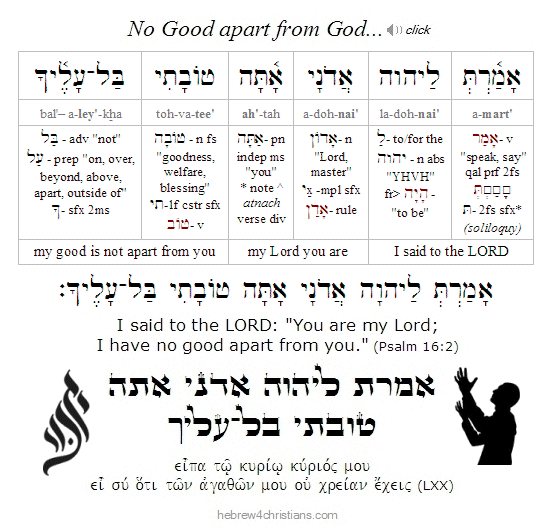 |
The Time of Visitation...
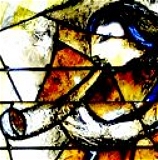
[ The holiday of Rosh Hashanah (Yom Teruah) begins in a couple weeks... ]
09.16.24 (Elul 13, 5784) We must ready our hearts for the time of the Lord's coming, for the hour draws nearer... Yeshua lamented over Israel: "You did not recognize the time of your visitation..." (Luke 19:44). But how was it possible for otherwise devoutly religious people to miss the advent of the Messiah were it not because they disregarded the signals meant to awaken them? "So also, when you see all these things, you know that he is near, at the very gates" (Matt. 24:33). That's part of the meaning of teshuvah as well: Repent and believe the message of life (see Heb. 3:7-4:11). Esau "repented" with tears, but his wasn't true repentance since he did not turn his heart to embrace the truth of God's love...
True repentance always leads to healing and life. When the woman from Magdala wept and washed Yeshua's feet with her tears, he said to those present, "I tell you, her sins, which are many, are forgiven -- for she loved much" (Luke 7:44-48). In other words, she was lavish in her love because she deeply regretted that she had missed what was most important, what she desperately needed all along... She realized her sin as blindness to God's love. After all, why would she weep over her sins unless she loved him? And how could she love him unless he first revealed his love to her? (1 John 4:19).
Friends, the Kingdom of God is at hand: wake up and be ready for the advent of the King! The sound of the shofar reminds us that the great Day of the LORD is drawing near and soon we will see our King Yeshua. Amen, Come Lord Yeshua!
Hebrew Lesson
Proverbs 1:23 Hebrew Reading:
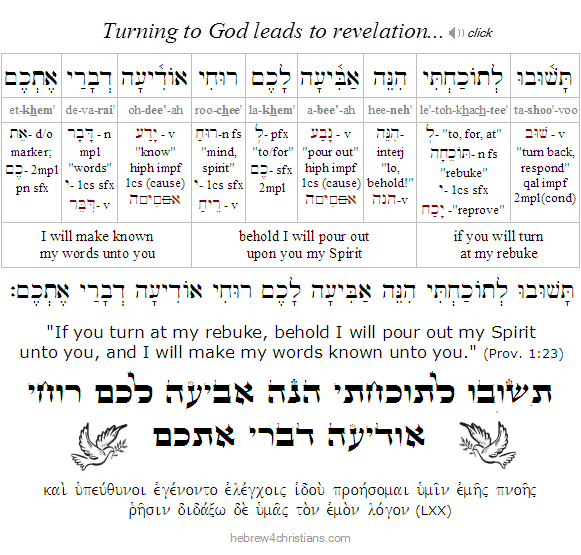 |
Finding Life in God...
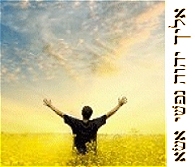
[ "God abides for ever in an eternal present, His knowledge, also transcending all movement of time, dwells in the simplicity of its own changeless present." - Boethius ]
09.16.24 (Elul 13, 5784) The name of the Lord is YHVH (יהוה), which comes from a root word meaning existence (i.e., hayah: היה, to be). It is this name that gives existence to creation, as it says, "in him all things hold together" (τὰ πάντα ἐν αὐτῷ συνέστηκεν; Col. 1:17) and by his power "all things are carried" (φέρων τε τὰ πάντα; Heb. 1:3).
In God we "live and move and have our being" (Acts 17:28) and "from him and through him and to him are all things" (Rom. 11:36). Some people think of "eternal life" as unending life or immortality of the soul, but eternal life (i.e., chayei olam: חַיֵּי עוֹלָם) transcends the idea of time and is centered in relation to the Living God, right now, wherever we are... Therefore Yeshua says to his followers, "Live in me and I will live in you" (John 15:4). We need not fear death, then, because we partake in the overcoming life of God given in Yeshua: there is no ultimate separation from his love. We have the "now" covenant with our Lord forever!
When we live in Messiah our true life is "concealed" and we pass over from the temporal world of shadows to the world of reality, from fear to comfort, from darkness to light. We "lose our life in order to find it" (Luke 17:33). The walk of faith surrenders all that this life may promise for the sake of finding true life in God.
Hebrew Lesson:
Psalm 139:5 Hebrew reading (click):
Holy Introspection....

[ Doing teshuvah requires courage and honesty, but a fearful life is not worth living.... ]
09.16.24 (Elul 13, 5784) We are all on a spiritual journey, writing the "Book of our Life." To help us in the "writing" process, the Jewish sages decided that the entire month of Elul should be set aside as a season for cheshbon hanefesh (חֶשְׁבּוֹן הַנֶּפֶשׁ) - "making an account of the soul." This means that we attempt to engage in honest self-examination about our behavior and ask where we have been and where we are going. After all, what is the essence of teshuvah (i.e., "repentance") if it is not honesty with yourself? "For everyone who does wicked things (lit., ὁ φαῦλα, that which is "easy," "worthless," or "vain") hates the light and does not come to the light, lest his works should be exposed" (John 3:20). Therefore we make some time to reflect about our lives from the previous year. We ask searching questions like, "How did I get to this place in my life?" "Where am I now?" "Am I where I should be?"
We engage in this process of self-examination with an aim to grow -- to let go of the pain and mistakes of the past in order to move forward. Confession (i.e., homologia: ὁμολογία) means bringing yourself naked before the Divine Light to agree with the truth about who you are. Indeed, the related verb word "homologeo" (ὁμολογέω) literally means "saying the same thing" - from ὁμός (same) and λόγος (word). We need to confess the truth if we are to be healed from the pain of the past (James 5:16). When King David wrote, יְהוָה אוֹרִי וְיִשְׁעִי מִמִּי אִירָ֑א - "The LORD is my Light and my salvation; whom shall I fear? (Psalm 27:1), he implied that he should even be free of fear of himself and of his past.
Of course we need God's help to do any of this, since it is easy enough to deceive ourselves, to deny the truth, in an attempt to protect our ego from shame. However being honest with ourselves is absolutely essential for any sort of authentic spiritual life... "No person is saved except by grace; but there is one sin that makes grace impossible, and that is dishonesty; and there is one thing God must forever and unconditionally require, and that is honesty" (Kierkegaard). Confession means "saying the same thing" about ourselves that God says - and that means not only acknowledging our various sins, transgressions, and iniquities, but also affirming our new identity as the beloved children of God. Saying that God doesn't love you is a lie as damning as denying His very existence...
Hebrew Lesson
Psalm 139:23-24 reading (click):
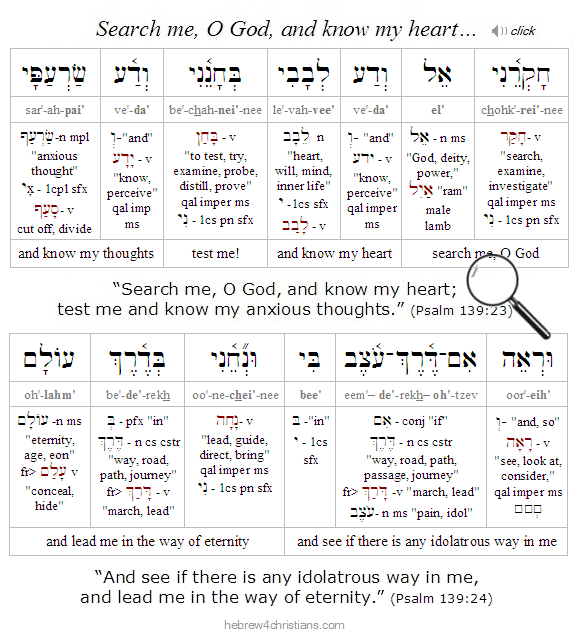 |
This Week's Torah:
Parashat Ki Tavo - כי־תבוא

09.15.24 (Elul 12, 5784) Shalom friends! Our Torah for this week (i.e., Ki Tavo) includes instructions for the people to ratify the Sinai covenant in the promised land by means of a special ceremony performed in the valley between Mount Ebal and Mount Gerazim (later fulfilled by Israel, see Josh. 8:30-35). During this ceremony the blessings for obedience and the curses for disobedience would be declared, and Moses warned the people by providing a seemingly endless description of terrible consequences that would befall the Jewish people if they disobeyed the terms of the Sinai covenant (Deut. 28:15-68). In Jewish tradition this litany of woe is called the "tochachah" (תּוֹכָחָה), a word that means "rebuke" or "reprimand."
Reading the tochachah is difficult and painful, though it serves as a bitter medicine to wake us up and prevent us from falling into a lethal coma. In that sense the tochechah may be regarded as a great blessing, since it shocks us into experiencing the gravity of God's grace. This is similar to Yeshua's grave warnings about the dangers of hell. If we refuse to listen or rush past his words, we are missing the substance of God's lament given through the Hebrew prophets. Sin is a lethal problem, and we must turn to God for healing or we will die. As Blaise Pascal once wrote, "Between heaven and hell is only this life, which is the most fragile thing in the world." Therefore shuvah! -- turn to God and receive the blessing of life!
Hebrew Lesson
Deuteronomy 26:1 reading (click):
This Week's podcast:
Parashat Ki Tavo..
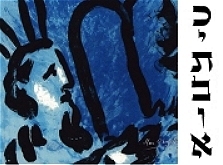
09.15.24 (Elul 12, 5784) Shavuah tov, chaverim. In this week's "Shavuah Tov" audio podcast (see the links below) I discuss the the 40 day "Season of Teshuvah" leading up to the Jewish High Holidays as well as some of the central themes from Torah portion Ki Tavo, which includes instructions for the people to ratify the Sinai covenant in the promised land by means of a special ceremony performed in the valley between Mount Ebal and Mount Gerazim. During this ceremony blessings for obedience and curses for disobedience would be declared, and Moses warned the people by providing a seemingly endless description of terrible consequences that would befall the Jewish people if they disobeyed the terms of the Sinai covenant (Deut. 28:15-68). I hope you will find it encouraging.
The Man Hanged on a Tree...

[ Ki Teitzei is always read during the Season of Teshuvah. It is my hope that this article will encourage you to "return to the LORD and listen to His Voice" (Deut. 30:2). ]
09.13.24 (Elul 10, 5784) Our Torah portion for this week (i.e., Ki Teitzei) includes the statement that a man who was to be executed and "hanged on a tree" (עַל־עֵץ) was under the curse of God, that is, was utterly condemned under the verdict of the law (Deut. 21:22-23). According to the Talmud (Nezakim: Sanhedrin 6:4:3), the Great Sanhedrin decided that "a man must be hanged with his face towards the spectators" upon a wooden stake, with his arms slung over a horizontal beam. It should be noted that while this is technically not the same thing as the gruesome practice of Roman crucifixion, the reasoning based on this verse was apparently used to justify the execution of Yeshua (Mark 15:9-15; John 19:5-7; 15). The exposed body was required to be buried before sundown to keep the land from being defiled. Besides the shame of this manner of death, the one so executed would be unable to fall to their knees as a final act of repentance before God, thereby implying that they were under the irrevocable curse of God (קִלְלַת אֱלהִים).
In this connection, we should note that Yeshua was falsely charged with blasphemy before the corrupt Sanhedrin of His day (Matt. 26:65; Mark 14:64; John 10:33) - an offence that was punishable by stoning (Lev. 24:11-16). However, since the Imperial Roman government then exercised legal hegemony over the region of Palestine, all capital cases were required to be submitted to the Roman proconsul for adjudication, and therefore we understand why the Jewish court remanded Yeshua and brought him to be interrogated by Pontius Pilate. Because Roman law was indifferent to cases concerning Jewish religious practices (i.e., charges of blasphemy), however, the priests further slandered Yeshua by illegitimately switching the original charge of blasphemy to that of sedition against Rome. The Sanhedrin undoubtedly rationalized their duplicity because the Torah allowed for an offender to impaled or "hung on a tree" (Num. 25:4), and since they were unable to do carry out this judgment because of Roman rule in the area, they needed Pilate to condemn him to death by crucifixion (Matt. 27:31; Mark 15:13-4; Luke 23:21; John 19:6,15). Note that crucifixion is mentioned elsewhere in the Talmud (Nashim: Yevamot 120b) regarding whether a widow can remarry if her husband had been crucified, as well as by the Jewish historian Josephus. The Talmud furthermore alludes to the death of Yeshua where Yeshua is said to have been crucified on "eve of Passover" (Nezekin: Sanhedrin 43a).
Some say that the word "cross" in the New Testament should be translated as "stake" or "tree" instead, claiming that the shape of the instrument that Yeshua was crucified upon was not cross-shaped or "cruciform." Now while the Greek word translated "cross" (i.e., σταυρός) is not fully described in the New Testament, according to ancient historians there were different "shapes" of the means used for crucifixion, including the crux simplex (|), the crux immissa (+), the crux commissa (T), and even stakes shaped as an X or Y. The "T" shape (commissa) was described by the historian Josephus, and is likely the form used to crucify Yeshua, since the early Christians all referred to it that way. There are also ancient Greek (pre-Christian era) descriptions of crucifixion. For example Herodotus (450 BCE) wrote: "they crucified him hands and feet stretched out and nailed to cross-pieces," which suggests that the cross immissa or commisa shape was used in ancient times... Incidentally the gruesome practice of crucifixion goes back to the ancient Persians and Phoenicians.
So it is likely that Yeshua was crucified on a stake made of a cedar tree that was formed by attaching a crossbeam to a pole that was inserted into the ground. It is also likely that he carried only the crossbeam, or gibbet, as he walked to Golgotha to be hung up to die, since the stake would likely have weighed 300 pounds or so, and after brutal flogging under Roman whips it is unlikely that even the strongest of men could carry one... Moreover, the description of a Roman soldier putting a sponge on a hyssop stalk to give Yeshua a drink suggests that he was crucified on "short cross," since the stalk was usually less than two feet long. Regardless of the exact shape of the cross, however, death by crucifixion was horrifyingly shameful and unutterably painful.... but Yeshua went there for you.
וְהוּא מְחלָל מִפְּשָׁעֵנוּ מְדֻכָּא מֵעֲוֹנתֵינוּ
מוּסַר שְׁלוֹמֵנוּ עָלָיו וּבַחֲבֻרָתוֹ נִרְפָּא־לָנוּ
ve·hoo mei·choh·lal mee-pe'·shah·ei'·noo mei·doo·ka me·a·voh·noh·tey'·noo
moo·sahr she·loh·mei'·noo ah·lav oo·va·cha·voo·ra·toh neer·pah- lah'·noo

"But he was pierced for our transgressions, he was crushed for our iniquities,
the correction of our peace was upon him, and by his wound we are healed"
(Isa. 53:5)
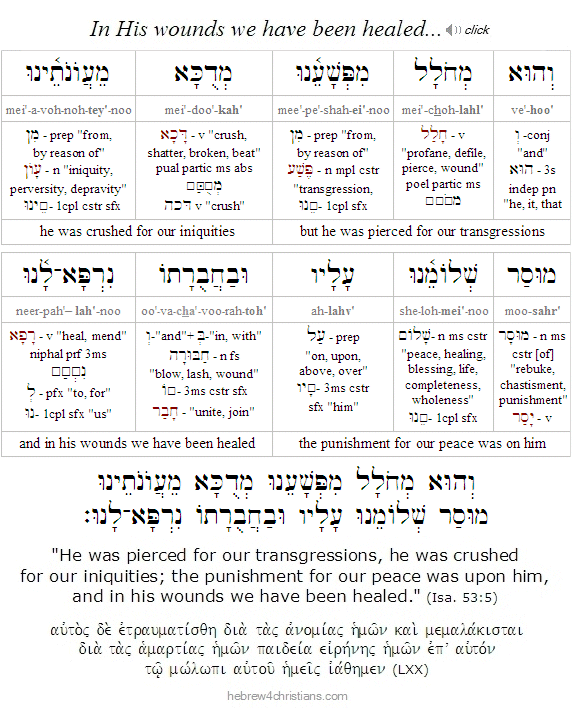 |
The Torah clearly teaches there is no remission of sin without the shedding of blood (Lev. 17:11, Heb. 9:22). The sacrificial death of Yeshua as the great "Lamb of God" was intended not only to cleanse us from sin (and to absolve us from the verdict of guilt as required by the law), but was also intended to fully satisfy both God's justice and and compassion (see Rom. 3:22-25; Psalm 85:10). In other words the cross is the place (ha'makom) where Yeshua "became sin for us" - the One who knew no sin - that we might be made the righteousness of God (2 Cor. 5:21). As the apostle Paul wrote: "The Messiah redeemed us from the curse of the law by becoming a curse for us -- for it is written, 'A Man hanged on a tree is cursed...' (Gal. 6:13, quoting Deut. 21:22-23). The Son of Man was "lifted up" to save from death as the brazen serpent (נְחַשׁ נְחֹשֶׁת) in the desert prefigured (Num. 21:9; John 3:14-15). And just before Yeshua died upon the cross, he said something of tremendous significance. Eyewitnesses to his crucifixion wrote, "When he had received the drink (of vinegar) Yeshua said, 'It is finished.' With that, he bowed his head and gave up his spirit" (John 19:30; Matt. 27:50). In Koine Greek, this final statement is recorded as a single word: tetelestai (Τετέλεσται), a cheer of victory and triumph. In Hebrew, Yeshua might have uttered, "nishlam" (נִשְׁלָם) or perhaps more likely "gemar tov" (גְמָר טוּב), testifying to his fully accomplished atonement (כַּפָּרָה) made on our behalf....
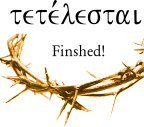
In Greek, the word tetelestai (Τετέλεσται) is an "indicative perfect passive" form of the verb teleo (τελέω) which implies that something has been completed with an enduring effect or state. The verb comes from telos (τέλος), a noun meaning a goal or purpose. Telos is the word Paul used when he wrote: "For Messiah is the end of the law (τέλος νόμου) for righteousness to everyone who believes" (Rom 10:4).
Tetelestai was the cry of victory to the Father. "I have finished the work you gave me to do." What was that work? To establish the new covenant (brit chadashah) between God and man by offering up His life as the atoning sacrifice for humanity's sins (Heb. 1:3, 10:12). The priesthood of Yeshua is said to be after the "order of Malki-Tzedek," based on a direct oath from God, that predates the operation of the Levitical priesthood (for more information about the role of Yeshua as our High Priest, see the article "Yom Kippur and the Gospel"). Yeshua was the only Tzaddik who ever completely walked out the truth of Torah. He expressed its inner meaning perfectly and embodied its truth in full. The Akedah of Yeshua (i.e., His crucifixion at Moriah) was the altar where the justice and chesed (love) of the Father fully met. If God were not just, Yeshua did not need to die; and if God were not loving, He would not have given up His Son as a ransom for our sin. Justice and mercy kiss.
The Torah (i.e., law) is holy, just and good (Rom. 7:12), but those seeking righteousness based on it's demands will discover the tragic fact that it is powerless to impart righteousness and life (2 Cor. 3:7-18). It is sin within the human heart that condemns people - not the law! The crucifixion of Yeshua condemned sin in the flesh (again, not the law) and now the righteousness of God is imparted to those who embrace Yeshua by faith (Rom. 8:3-4). Enabled by the Holy Spirit, with the law now written upon our hearts (Jer. 31:31-3; Heb. 8:10-11), we are empowered to fulfill the requirements of the law based on a new covenant relationship with God (Gal. 2:16, 3:2). We no longer seek righteousness by means of maintaining ritualistic or other ordinances (Rom. 4:5, Gal. 2:16) but by receiving the free gift of Messiah's righteousness imputed to us through our trust (Eph. 2:8-9). Because of Yeshua's victory, we do not strive for acceptance before the Father, we abide within it, chaverim (John 15:4).
Imagine for a moment what it might have been like to hear Yeshua cry out, "It is finished!" His final breath, His kiddush Hashem, His spirit given up and now released before the Father - the resonance of this word filling all heaven and all earth - "It is finished! Father! It is finished! I have completed the work that you have given me to do!" Imagine the joy, the celebration, the glory, the honor given to the Son as He appeared before the Father after securing us so great a salvation.
Because Yeshua became our "serpent" upon the cross, all those who have been bitten by snake and poisoned by the venom of sin may be delivered. Just as the image made in the likeness of the destroying snake was lifted up for Israel's healing, so the One made in the likeness of sinful flesh (Rom. 8:3) was to be lifted up as the Healer of the world. Likewise with the other pictures of our Savior as the "leper Messiah," as the "red heifer" who purifies from death, as the "scapegoat" sacrifice who sends our sins into exile, and so on. Yeshua is Adonai Tzidkenu - the LORD our Righteousness. Blessed be His Name forever and ever...
 |
Shavuah Tov Podcast:
The Offense of the Cross...
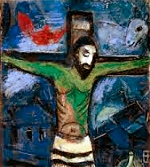
09.13.24 (Elul 10, 5784) Yeshua repeatedly took the role of a "stumbling block" to test people's response to his ministry. Most people were offended at Him, of course, and in the end Yeshua was crucified for the sake of their offenses. After His death, the cross itself became the scandal of faith. The Apostle Paul referred to the "offense of the cross" which he did not want removed. But what is the "offense of the cross" and why is the proclamation of the crucified Messiah a scandal (σκάνδαλον) to Jews and foolishness to the Gentiles?
The Friend of Sinners...
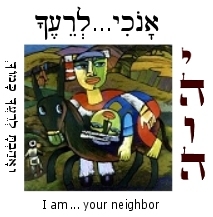
[ "God be praised that it is not because of my worthiness that God loves me. Otherwise, I might at any moment die of fear lest the next moment I cease to be worthy." - Kierkegaard ]
09.13.24 (Elul 10, 5784) "The Son of Man came ... and they say, 'Look at him! A glutton and a drunkard, a friend of tax collectors and sinners!'" (Matt. 11:19). People -- and especially the religious people -- were scandalized by Yeshua because he was a "friend of tax collectors and sinners!" Yet what sickness of heart is this, to despise those who are sick? It is a sorrow of heart to realize that religion often creates an "in-group" mentality that attains its status at the expense of the "outsider," the "stranger," the "sinner," and so on... The prayer of the self-righteous is always: 'God, I thank you that I am not like other people: extortionists, unrighteous people, adulterers – or even like this tax collector" (Luke 18:11).
The religious leaders of Yeshua's day were offended because he "welcomed sinners" and enjoyed eating meals with them (Luke 15:2). We can almost hear their disapproving whispers and their dismissive accusations: "How could a good Jew behave like this? Does he not understand the call to personal holiness? Does he not know the Torah of "clean" and "unclean"? If a man is known by the company he keeps, we know enough about Yeshua to know that he's not truly pious..." And to this very day the self-righteous find offensive the idea that God welcomes the sinful, the needy, the broken, the despised, and the "outsider" into His presence... As Yeshua said, "those who are well have no need of a physician," and indeed offering them God's cure will always be regarded as a kind of poison...
We greatly rejoice that God indeed is the friend of sinners; He is the Good Shepherd who seeks and saves the lost. Thank the Lord that he comes not for the "righteous" but for those who are brokenhearted, for those mortally wounded by their own sin... Any so-called theology or religion that repudiates or minimizes God's love for the sinful, the needy, the broken, is little more than a shrine to human pride and vanity... On the contrary: the heart of the Compassionate One always welcomes a sinner who sincerely turns to Him.
Hebrew Lesson
Psalm 23:3 reading (click):
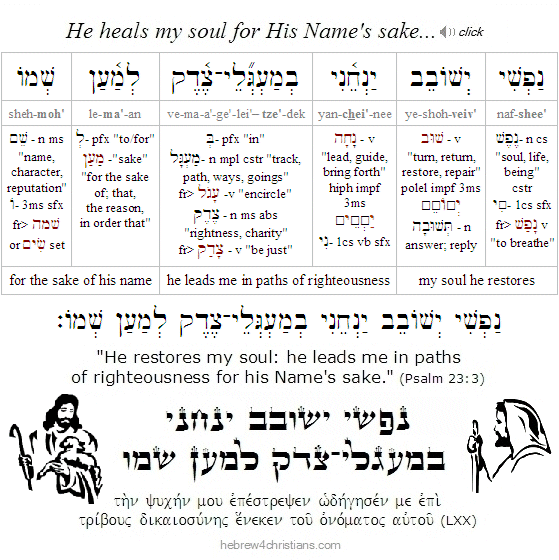 |
Anxious for Nothing...

09.13.24 (Elul 10, 5784) If you are anxious over the latest rumor (or outrage) of the day, remind yourself that there is far more to life than what's going on in this world... "Look up into the heavens. Who created all the stars? He brings them out like an army, one after another, calling each by its name" (Isa. 40:26). The invisible things of Him are "clearly seen" by the eye of faith (Rom. 1:20; Psalm 19:1). Therefore let us refuse to agree with this world's way of seeing and its darkened visions; let us abandon the godless news of this age; and let us take every thought captive to the truth of Messiah. As it says in our Scriptures: "Do not be conformed to this world, but be transformed by the renewal of your mind, that by testing you may discern what is the will of God, what is good and acceptable and perfect" (Rom. 12:2).
Hebrew Lesson
Psalm 146:8 Hebrew reading (click):
Fighting the Evil Eye...

[ "Rejoice not against me, O mine enemy: when I fall, I shall arise; when I sit in darkness, the LORD shall be a light unto me." - Micah 7:8 ]
09.12.24 (Elul 9, 5784) Our Torah portion this week (Ki Teitzei) commands us to remember what the Amalekites did to the Jewish people after they left Egypt during the time of the Exodus (Deut. 25:17). Recall that the Israelites had reached Rephidim after crossing the sea when the nation of Amalek sneaked up and attacked them. Spiritually speaking, Amalek picked up where the Pharaoh had left off, since their evil intent was to enslave the people and to prevent them from reaching the promised land. In the account given in the book of Exodus, after Israel successfully fended off the assault, God paradoxically commanded them to "blot out the remembrance" of Amalek yet also foretold the need to fight Amalek "from generation to generation" (Exod. 17:14-16). But how are we to understand the commandment to "blot out the remembrance" of something from generation to generation? If we obey the commandment not to remember, why are we to remember?
Perhaps the solution to this riddle may be found in the name "Amalek" (עֲמָלֵק), which begins with the letter Ayin (symbolizing the eye) and equals 240 in gematria -- the same value for safek (סָפֵק), the Hebrew word for doubt. Amalek therefore would symbolize "the eye of doubt," or even "the severed eye" (the Hebrew verb מָלָק means "to chop" or "sever" in reference to the "eye" of Ayin). The "power" of Amalek therefore represents skepticism and spiritual blindness as it acts itself out in the world.
On a "deeper" level, some of the sages have said that Amalek represents doubt within our own hearts. When we read "Remember what Amalek did to you on the way out of Egypt," we can read "Remember what doubt did you," or how doubt fell upon you and attacked your faith. After all, did not some of the Israelites lapse in their faith in the desert? Did they not question God at Massah murmurring "is the LORD with us or not?" (Exod. 17:7).
In Jewish tradition, Amalek represents pure evil, or those who have "given themselves over" to Sitra Achra, the dark side of impurity, and therefore the LORD vowed perpetual warfare against Amalek: "The Hand is on God's throne. God shall be at war with Amalek for all generations" (Exod. 17:16). Concerning this verse the great commentator Rashi noted that the term "God's throne" is written incompletely in Hebrew as kes Yah (כֵּס יָהּ), rather than as kisei Adonai (כִּסֵּא יְהוָה), which suggests that God's rule will be incomplete until the powers of darkness are totally wiped off the face of the earth (by the hand of Yeshua our LORD; see Rev. 19-20). Amalek embodies the principle of lo yareh HaShem, the lack of the fear of God, and therefore represents the power of darkness and evil in the world. The Torah states that we must "go out and fight" Amalek, which is a call to ongoing spiritual warfare in our lives (Deut. 25:17-19). We can't sit by and passively accept evil; nor can we ignore it or pretend that it doesn't exist. We must call evil by its name and exercise spiritual authority over it (Eph. 5:11; Luke 10:19). The weapons of our warfare have divine power to destroy enemy strongholds (2 Cor. 10:4). We are protected by the armor of God and "weapons of light" (Rom. 13:12; Eph. 6:11-18).
The battle with Amalek came after the incident at Marah, where the bitter waters were turned sweet by means of the "healing tree" that was felled (Exod. 15:25), a picture of the cross of the Messiah who gives us living water (mayim chayim) and who saves us from the power of evil and death. When we are cleansed and sanctified by the sacrificial blood, we will overcome evil by the power of God's grace and goodness, though this requires earnest faith on our part. When Moses raised his hands in battle against the Amalekites, the Israelites prevailed, but if he lowered them, they suffered defeat (Exod. 17:11). Eventually Moses grew weary and he needed Aaron and Hur to help him hold his arms steady to ensure victory (Exod. 17:12). Note that the Hebrew word translated "steady" is emunah (אֱמוּנָה), the word for faith... It was Moses' steady faith in God's power that gave Israel the victory over the powers of darkness, just as we lift up our faith in God's power demonstrated at the cross gives us the victory over Satan and his schemes.
Hebrew Lesson
Deut. 25:17 Hebrew reading (click):
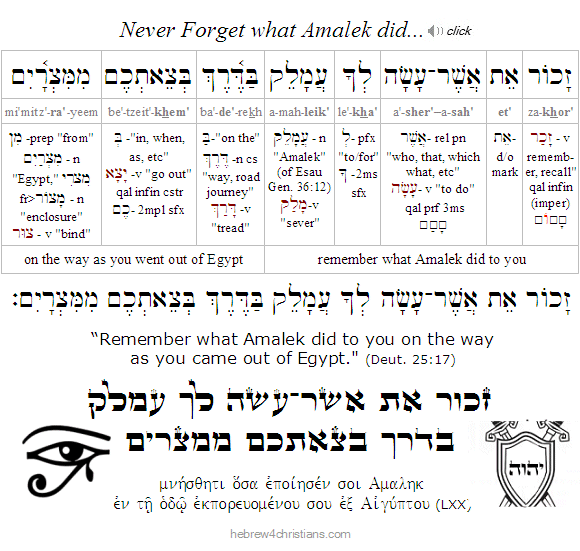 |
Restoring what is lost...
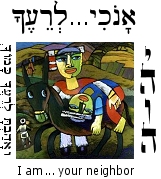
09.12.24 (Elul 9, 5784) In our Torah portion this week (Ki Teitzei) we read: "Do not ignore the loss of your brother... you shall restore it to him" (Deut. 22:1-3). This indicates that we have a moral duty to return lost items to others, and on a spiritual level that includes restoring honor and dignity to those who have lost sight of their value in the eyes of God... For even greater reason we must make restitution to those whom we have harmed.
Making amends is part of the teshuvah process. We hurt ourselves when we hurt others, and we hurt others when we hurt ourselves. The way out of that circle is through making amends. As Yeshua taught: "If you are offering your gift at the altar and there remember that your brother has something against you, leave your gift there before the altar and go. First be reconciled to your brother, and then come and offer your gift" (Matt. 5:22-23). "Therefore, confess your sins to one another and pray for one another, that you may be healed. The prayer of a righteous person works great power" (James 5:16). Ultimately, confession of the truth is not optional for anyone.
Indeed, regarding the duty to restore what is lost to our brother mentioned above, the Torah adds, "and you are not to ignore it," which literally reads, "you are unable to hide it" (לא תוּכַל לְהִתְעַלֵּם). Abraham Twerski noted that the Torah is not giving us a command as much as stating a fact: You are unable to hide from a wrongful act. In other words, the problem with "getting away with it" is that you get away with it, that is, you take it with you. Such self-deception sears your conscience, makes you numb inside, and deadens the heart. Making amends to others is life-giving, helping you let go of what you've done wrong to restore inner peace. We must be vigilant not to let our hearts die because of either shame or rationalization. May the LORD help us walk in the Spirit of Truth.
Hebrew Lesson
Lev. 19:18a Hebrew reading (click):
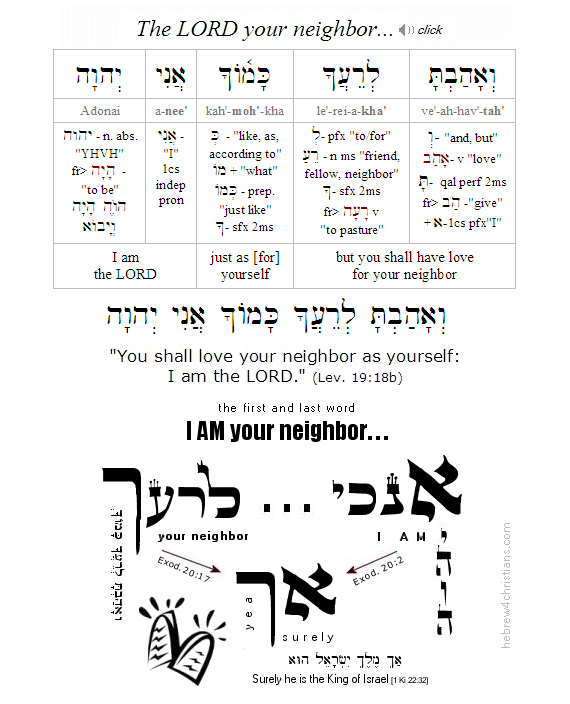 |
Blessed Inner Poverty...
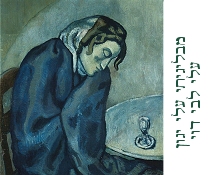
09.12.24 (Elul 9, 5784) The word ashrei (אַשְׁרֵי) in Hebrew can mean "the happy ones," from the adjective osher (אוֹשֶׁר), "happy," and the root word ashar (אָשַׁר) meaning to "go straight" or to walk uprightly (i.e., yashar: יָשָׁר). Ashrei can also mean "enriched," or favored. Enriched is the man (אַשְׁרֵי־הָאִישׁ) who ... delights in the Torah..." (Psalm 1:1-2). The sages note that ashar is formed from aleph (א), representing the One true God, and sar (שַׂר), meaning ruler, which suggests that when the LORD is the Ruler of your life, you will be enriched and find genuine happiness. Indeed, the word ashrei is embedded in both the first and last words of the Torah scroll itself (i.e., bereshit (בְּרֵאשִׁית) and Yisrael (יִשְׂרָאֵל)), which hints that we are made happy when we submit to God's will (i.e., his Torah) for our lives...
The Torah of the LORD is most clearly manifested in Yeshua, the Living Torah and Messiah of God, the Wisdom of God: "And he opened his mouth and taught them, saying: 'Blessed are the poor in spirit, for theirs is the kingdom of heaven'" (Matt. 5:2-3). Paradoxically we are profoundly enriched by understanding our great inner poverty and our ongoing need for divine intervention... Only when we come to the end of ourselves, when we realize our powerlessness and radical insufficiency, can we come to know Yeshua as moshia (מוֹשִׁיעַ), as our Savior. And this is an ongoing state of dependency: we walk "with a limp" as did Israel. Therefore Paul said, ὅταν γὰρ ἀσθενῶ, τότε δυνατός εἰμι: "for when I am weak, then I am strong." You are made rich indeed when you encounter your spiritual bankruptcy, brokenness, and must entirely depend on God for your daily miracle...
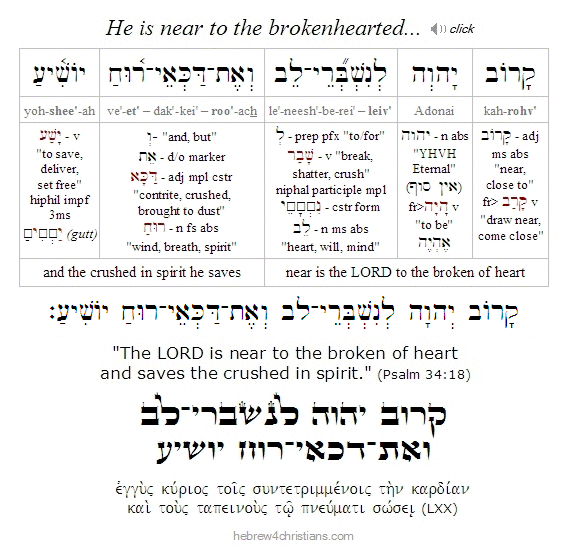 |
Spirituality often enough involves a sense of irremediable brokenness, a feeling that you are not whole, that you are a mess, and that your need for God's healing is constant and relentless... Contrary to the ideals of proud humanism, spirituality is a state of "blessed neediness," of being "poor in spirit," that aches with inner desperation for God's power of healing. Those who humbly cry out to the LORD understand their great need for deliverance, "Woe is me, for I am ruined..." (Isa. 6:5). As Yeshua said, "Everyone who exalts himself will be humbled, but the one who humbles himself will be exalted" (Luke 18:14).
Our Lord Yeshua testified: "The Son of Man came to seek and to save the lost" (Luke 19:10), and therefore He is found in the midst of the leper colonies of the hurting, the forgotten, and the rejected. As the "Man of Sorrows" (i.e., ish makhovot: אִישׁ מַכְאבוֹת) he understands the language of our pain (Isa. 53:3).
Parashat Ki Teitsei:
Why then the Law?
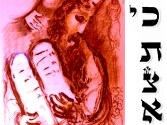
09.11.24 (Elul 8, 5784) Our Torah reading this week, parashat Ki Teitzei, is notable because it contains more commandments than any of the other 52 weekly Torah readings, which according to the total enumerated by Maimonides, is 74 (that is over 12% of the 613 commandments). These various commandments cover a wide assortment of rules related to ethical warfare, family life, burial of the deceased, property laws, fair labor practices, proper economic transactions, agricultural tithes, concerns about giving tzedakah, and so on. Even rules about a mother bird and her young are included (Deut. 22:6-7). Your Heavenly Father knows when the sparrow falls (Matt. 10:29).
In every aspect of human life - religious, moral, social, civil, environmental, agricultural, dietary, sexual, and so on - the Torah has its voice. For example, Rabbi Pinchas ben Hama said, "Wherever you go and whatever you do, pious deeds will accompany you. When you build a new house, 'make a parapet for your roof' (Deut. 22:8). When you make a door, 'write the commandments upon your doorposts' (Deut. 6:9). When you put on new garments, 'do not wear cloth that combines wool and linen' (i.e., shaatnez; Deut. 22:11). When you cut your hair, 'do not round the corners of your head' (Lev. 19:27). When you plow your field, 'do not plow with an ox and an ass together' (Deut. 22:10). When you reap your harvest, and have forgotten a sheaf, do not pick it up. Leave it for the stranger, the fatherless, and the widow (Deut. 24:19). And even if you are not engaged in any particular kind of work but are merely journeying on the road, the precepts accompany you. If a bird's nest is before you on the road, 'do not take the mother with her young' (Deut. 22:6-7)." We might add, whenever you eat or drink something we are to recall how God's Presence sustains us (1 Cor. 10:31).
The pervasive scope of God's commandments indicates that there is no "dividing line" between the sacred and the profane in the life of the tzaddik (saint). The world is not compartmentalized into the realms of the spiritual and the material. No, "the whole earth is filled with the glory of God," and it is only because of spiritual blindness that we do not discern this truth. Simply put, all the various commandments found in the Scriptures were given because the spiritual realm is intended to permeate every aspect of our lives (1 Cor. 10:31). Just as reciting 100 blessings a day helps us be mindful of the source of our blessings, so studying the Torah's commandments helps us to "wake up" to divine Presence regarding every practical decision we make.
So the Scriptures are filled with commandments intended to awaken us to the reality of God's immanent Presence. Da lifnei mi attah omed (דַּע לִפְנֵי מִי אַתָּה עוֹמֵד) - "Know before Whom you stand." There are 613 commandments given in the Torah of Moses, hundreds more found in the Writings and the Prophets, and over a thousand revealed in the New Testament. All of these imperatives are intended to give voice to the concern and love of God by pointing to the blessing of knowing the Divine Presence in the midst of our daily lives. That is the general idea, though the specifics are where we are apt to get confused....
Because our Torah reading contains so many commandments, the question naturally arises as to whether followers of Yeshua and partakers of the New Covenant are obligated to follow the lawcode of Moses or not... In the following Shavuah Tov broadcast (see the links below), I explore how we may be able to understand the role of the law in light of the salvation given in Yeshua the Messiah. I hope you will find it both provocative and helpful.
The Truth Matters...
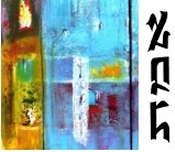
[ "Truth is not something you can appropriate easily and quickly. You certainly cannot sleep or dream yourself to the truth. No, you must be tried, do battle, and suffer if you are to acquire the truth for yourself. It is a sheer illusion to think that in relation to the truth there is an abridgment, a short cut that dispenses with the necessity for struggling for it." - Kierkegaard ]
09.11.24 (Elul 8, 5784) Truth matters. I don't mean "opinion" here, but real, objective, hard-core truth. Truth reveals reality. Aristotle defined it this way: "To say of what is that it is not, or of what is not that it is, is false, while to say of what is that it is, and of what is not that it is not, is true" (Metaphysics). Genuine knowledge (γνῶσις), as opposed to illusion, depends on truth, since knowledge constitutes true belief, whereas illusion (and opinion) does not. The Greek word for truth is aletheia (ἀλήθεια, from α[not] + λήθω [to hide]) which implies being awakened to the revelation of being. The Hebrew word for truth is emet (אֱמֶת), which is related to the idea of fidelity or correspondence with reality (אָמַן).
How you think about life has implications. You are responsible to think clearly. God's hidden attributes are clearly apprehended by the mind so that people who deny spiritual reality are without excuse (Rom. 1:19-20). If you think a map will faithfully guide you to the right place, you will use it; if you think it leads to an opposite end, you will not. Thinking one way leads you to success, whereas the other way leads to failure. The Scriptures warn: "there is a way that seems right to a man, but its end is the way of death" (Prov. 14:12).
Hebrew Lesson
Proverbs 14:12 Hebrew reading (click):
Truth (אֱמֶת) apart from God who is Alef (א) leads to death (מֵת). Sincerity of conviction is no test of truth since you can be sincere and sincerely wrong. How many have perished in this world because they believed they were on the right course when in fact they were not? Yeshua made bold the claim that there was no way to know the heart of God apart from him... there is salvation is no other. Either he spoke the truth or he did not; either he can be trusted for the direction (תּוֹרָה) of your life or he cannot; either he expresses the Salvation of God or he does not. The issue of truth demands that we must choose whom we will serve.
Torah of the Neighbor...
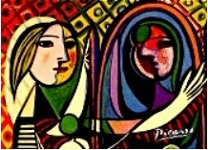
[ It's called the second great commandment because, as Kierkegaard said, "God is the middle term. Only by loving God above all else can one love the neighbor... 'Thou shalt love thy neighbor as thyself,' but when the commandment is rightly understood it also says the converse, 'Thou shalt love thyself in the right way.' If anyone, therefore, will not learn to love himself in the right way, then neither can he love his neighbor. To love one's self in the right way and to love one's neighbor are absolutely analogous concepts, are at bottom one and the same." ]
09.11.24 (Elul 8, 5784) Shalom friends. In our Torah portion this week (i.e., Ki Teitzei), Moses gave various laws or rules about how we are to regard and treat our neighbor. For example, he said that if we see a sheep or ox wander away from a neighbor's property, we should bring it back to him or her. If the animal is "stray," however, and the owner is unknown, we should care for it until he or she is identified and then restore it to them. Moses went on to say that this principle applies to anything of value that was lost and belongs to another. We are forbidden to say "finders keepers!" or to pretend it does not matter if we disregard any loss to our neighbor. Moses insisted that we have a duty to care for our neighbor and to protect his or her interest as if it were our own. Indeed Moses connected the principle of restoring a lost object to helping a neighbor in his need. For instance, he said that if we see our neighbor trying to get his ox up that had fallen down, we should help him get the animal on its feet again (Deut. 22:1-4).
The language used in the Torah regarding this discussion is somewhat unique. When we see our neighbor's lost animal, we are not to "unsee" or ignore it. The Torah literally reads "you shall not see" (לֹא־תִרְאֶה) your brother's animal go astray and then "hide yourself" (וְהִתְעַלַּמְתָּ) by acting as if it is none of your concern. This language is repeated a bit later in the passage: "you must not hide yourself" (לֹא תוּכַל לְהִתְעַלֵּם) which may be read as "you cannot hide yourself," or "you are not able to hide yourself," because God sees through your pretense, your willful closing of your eyes, and your indifference to the needs of others (Prov. 15:3; Heb. 4:13).
The fact that God sees what is hidden is the reason why we should not "hide ourselves" from our neighbor's trouble, and that justification is expressed by the recurring statement appended to many of the Torah's commandments, namely, "I am the LORD" or "I am the LORD your God." For instance, it is written: "You shall not curse the deaf or put a stumbling block before the blind, but you shall fear your God: I am the LORD (אנִי יְהוָה)." "You shall not take vengeance or bear a grudge against the sons of your own people, but you shall love your neighbor as yourself: I am the LORD (אנִי יְהוָה)." "Every one of you shall revere his mother and his father, and you shall keep my Sabbaths: I am the LORD your God (אֲנִי יְהוָה אֱלֹהֵיכֶם), and so on. "I am the LORD" means "I am watching," which implies the Lord will help you keep his commandments if you are willing to do so but He will also keep account of your indifference if you choose to harden your heart...
Recall that the Ten Commandments begin with the word "I AM" (i.e., אָנֹכִי) and ends with the word "[for] your neighbor" (i.e., לְרֵעֶךָ). Joining these two words together says "I am for you" or "I am your neighbor," indicating that the LORD Himself is found in your neighbor. When we love our neighbor as ourselves (וְאָהַבְתָּ לְרֵעֲךָ כָּמוֹךָ), we are in effect showing love for the LORD. There is a connection, therefore, between honoring God and caring for others, and conversely, between being indifferent - hiding yourself from your neighbor - and dishonoring God.
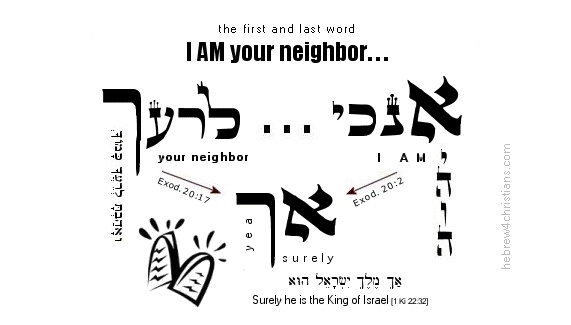 |
All this indicates that the heart of the commandments is to care for one another, as it is written, "You shall love your neighbor as yourself: I am the LORD" (Lev. 19:18), which Yeshua identified as the great commandment (along with loving God, of course), and which the apostle Paul said was the fulfillment of the Torah itself (Gal. 5:14; Rom. 13:10).
The heart of the commandments could be stated negatively, of course, as "You shall not be indifferent to your neighbor. You shall not close your eyes to the needs and troubles of others. You shall not hide the truth from yourself. You shall not excuse yourself from responsibility. In other words, as Lo tuchal l'hitaleim: "You must not be indifferent."
It is said "derekh eretz" (דֶּרֶךְ אֶרֶץ) or "the way of life," precedes the Torah (קָדְמָה לַתּוֹרָה), by which is meant that we must first care for the blessing of life before we can hear God's truth. The sages said: "If there is no derekh eretz there is no Torah, and if there is no Torah there is no derekh eretz" (Avot 3:17), which means that moral truth must precede the Torah, but after the Torah has been given, a deeper sense of moral reality is revealed. In other words, the context of Torah is the basic intuition for the value and sanctity of life, and without that foundation, the various commandments of the Torah will not be rightly understood (see Rom. 2:13-15). Respecting life is the essence of the matter! Lo tuchal l'hitaleim: "You must not be indifferent!" Amen, and may the God write the truth of his love upon our hearts.
Hebrew Lesson
Zechariah 7:9 reading (click for audio):
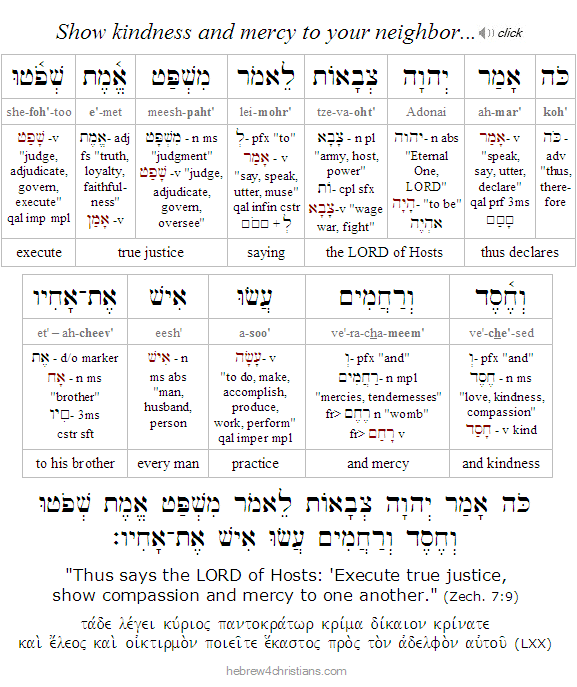 |
תורת האמונה
The Torah of Faith...
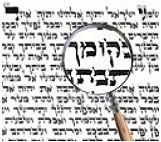
[ The following entry concerns this week's Torah reading, parashat Ki Teitzei, which contains more commandments than any other Torah portion... ]
09.10.24 (Elul 7, 5784) When asked how many commandments are in the Torah, most Jewish scholars will answer 613, based on Jewish tradition (the number 613 is sometimes called "taryag" (תריג), an abbreviation for the letters Tav (400) + Resh (200) + Yod (10) + Gimmel (3) = 613). Despite several attempts made over the centuries, however, there has never been a definitive list of these commandments, and of those who tried to compile such, no two agree... Some say the number 613 comes from a fanciful midrash that teaches that since there are 365 days in a year (corresponding to the 365 negative commandments) and 248 "parts" of the body (corresponding to the positive commandments), each day we should use our body to serve God.
Regardless of the exact count, however, the Talmud (Makkot 23b-24a) says, "Moses gave Israel 613 commandments, David reduced them to eleven (Psalm 15), Isaiah to six (Isaiah 33:15-16), Micah to three (Micah 6:8), Isaiah reduced them again to two (Isaiah 56:1); but it was Habakkuk who gave the one essential commandment: v'tzaddik be'emunato yich'yeh, literally, "the righteous, by his faithfulness - shall live." In the New Testament, the apostle Paul had (earlier) distilled the various commandments of the Torah to this same principle of faith (see Rom. 1:17, Gal. 3:11, and Heb. 10:38).
This small phrase, consisting of just three words (וְצַדִּיק בֶּאֱמוּנָתוֹ יִחְיֶה), is perhaps the pivotal axis upon which our salvation turns, since it distills the requirement that we are justified by our faith in God, and not by "works of righteousness which we have done" (Titus 3:5). In other words, salvation is "of the LORD," it is his righteousness given to us through his love...
All the Torah's commandments may be derived from the Ten Commandments given at Sinai, the most basic of which is the very First Commandment, namely, "I AM the LORD your God (אָנכִי יְהוָה אֱלהֶיךָ) who brought you out of Egypt, out of the house of slavery" (Exod. 20:2). This is the starting point for the law, namely to believe that God exists and has personally redeemed you from the slavery of your past. This is the very first step of Torah, since until you personally believe that the Lord is your God who redeems you, none of the other commandments will have any traction within your heart... Amen, Yeshua taught us the law of faith in God's love (תורת האמונה), which preempts, overrules, and informs all the others...
Hebrew Lesson
Habbakuk 2:4 reading (click for audio):
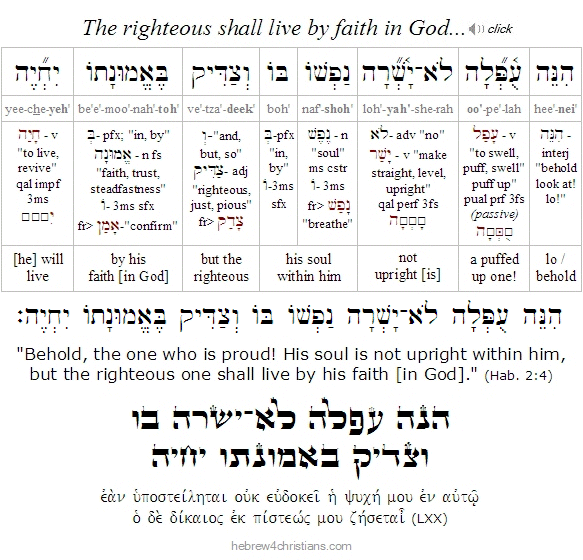 |
Victory over Evil...
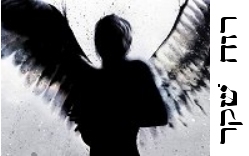
[ "The light shines in the darkness, and the darkness cannot overcome it." - John 1:5 ]
09.10.24 (Elul 7, 5784) This week's Torah portion (Ki Teitzei) begins: "When you go out to war over your enemies" (i.e., כִּי־תֵצֵא לַמִּלְחָמָה עַל־איְבֶיךָ), which would seem to make more grammatical sense were it to say, "When you go out to war against your enemies..." The sages comment that the Torah is here saying that when we go out to war, we start out "over" our enemies, that is, in a state of victory by God's grace (Exod. 14:14).
This has practical ramifications for our walk with God today. Spiritual warfare centers on trusting God to fulfill his promises, and therefore we can understand our enemies to be the three enemies of the soul, namely, our own lower nature (yetzer ha'ra), the devices of Satan, and the godless philosophy of this present world of darkness (Eph. 2:2-3; 1 John 2:15-17; Eph. 6:10-11). Nevertheless we are assured victory over these by faith, understanding that "no good thing does the LORD withhold to those who are trusting in Him" (Psalm 84:11).
In the midst of the battle, then, offer up praise (Psalm 18:3). God works all things together for your good (Rom. 8:28). "You are the God of my salvation (אֱלהֵי יִשְׁעִי), and in You do I hope all the day (Psalm 25:5). Barukh attah Adonai, shomei'a tefillah: (בָּרוּךְ אַתָּה יהוה שׁוֹמֵעַ תְּפִלָּה) – "Blessed are You, O LORD, who listens to prayer." Because of the victory of Yeshua at the cross, we do not work toward a place of victory against our enemies, but rather from the place of His victory (1 Cor. 15:57).
Blessed is our LORD Yeshua, the Killer of death; the Slayer of the Serpent; the final Victory of God's awesome love for us! We are made more than conquerors (ὑπερνικῶμεν, lit. "hyper-conquerors," "overcomers") through Him that loved us (Rom. 8:38). Therefore "thanks be to God, who in our Messiah leads us in a perpetual victory parade" (2 Cor. 2:14).
Hebrew Lesson
Psalm 84:11b reading (click for audio):
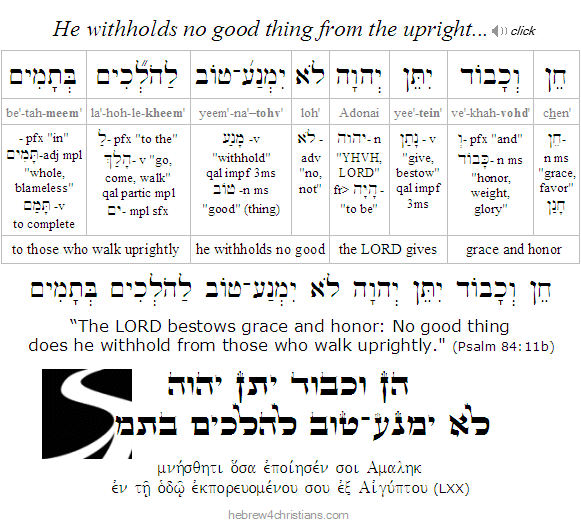 |
Return of the Heart...

[ "Only the person who has had to face despair is really convinced that he needs mercy. Those who do not want mercy never seek it. It is better to find God on the threshold of despair than to risk our lives in a complacency that has never felt the need of forgiveness. A life that is without problems may literally be more hopeless than one that verges on despair." - Thomas Merton ]
09.09.24 (Elul 6, 5784) Part of the meaning of teshuvah (i.e., "repentance"), at least for some of us, is learning to trust and believe in love.... This is a very deep turning of the heart. If you were abandoned as a child, for instance (or even as an adult) you were deprived of the security, nurture, and basic human connection you needed to partake in love. Instead of gaining a sense of belonging and acceptance your soul desperately needed, you inherited a sense of shame that taught that you were inherently unlovable and unworthy. Consequently, as you grew up, you may have found it difficult to trust or ask others for help; you might have turned inward, relying only on yourself, protecting yourself from further pain. You may have became lonely, filled with sadness, anger, and fear. Ironically and tragically, as you protected yourself from abandonment you made your heart hard and numb, and that led to the abandonment of yourself....
We have to be careful here, friends, as Soren Kierkegaard astutely wrote, "To despair over one's sins indicates that sin has become, or wants to be, internally consistent. It wants nothing to do with the good, does not want to be so weak as to listen occasionally to other talk. No, it insists on listening only to itself, on having dealings only with itself; it closes itself up within itself, indeed, locks itself inside one more enclosure, and protects itself against every attack or pursuit from the good by despairing over sin." As C.S. Lewis later affirmed: "the doors of hell are locked on the inside." Frederick Buechner also likewise warned: "Despair has been called the unforgivable sin - not presumably because God refuses to forgive it, but because it despairs of the possibility of being forgiven."
There are providential miracles... Healing can come when we turn again to ourselves - unconditionally accepting ourselves despite the pain of our past - and open our hearts to be loved. It was when he "came to himself" that the prodigal made the decision to go back to his father (Luke 15:17). Therefore the Spirit of God calls out to the bereft: "Return to your heart and know" (Deut. 4:29). This is possible only if we are willing to turn to God for the grace we need to be made whole. It is by turning to God (i.e., teshuvah) that we find ourselves to be beloved and made whole. Believing in God's love for us enables us to truly love ourselves, and from that connection, we can move out to love others as well.
O friend of broken hope, savor the phrase, "Know therefore today and return to your heart..." It the heart that is the place of connection with God... As Yeshua said, "Behold, I stand at the door and knock. If anyone hears my voice and opens the door, I will come in to him and eat with him, and he with me" (Rev. 3:20). Today may you find courage to "return to your heart" and receive again God's love for your soul... Amen.
Hebrew Lesson
Deut. 4:29 reading (click for audio):
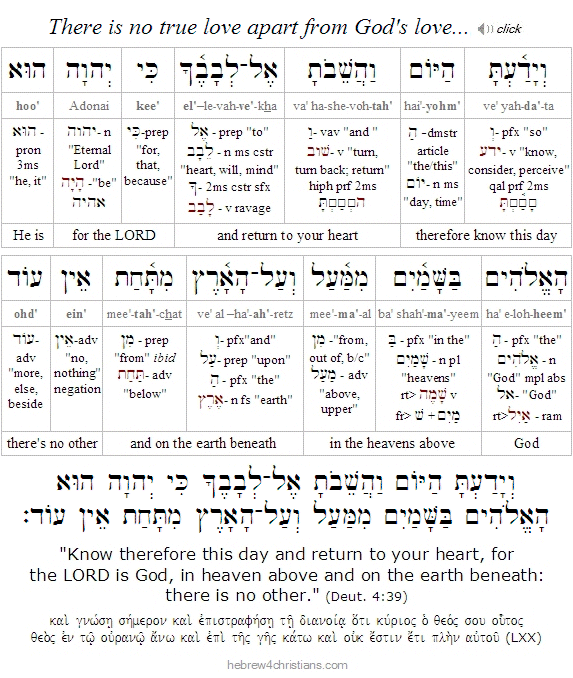 |
His Precious Forgiveness...

[ The following entry concerns the blessed theme of teshuvah during the month of Elul and the days leading up to Yom Kippur, or the "Day of Atonement"... ]
09.09.24 (Elul 6, 5784) There is a temptation to minimize the wickedness of our sin and thereby to hide our need for deliverance from ourselves. We tend to be proud and foolish, thinking that somehow we're "going to make it," though to what end we are often unaware. Make it to what? What is the "end game" of your life? Though it offend our carnal pride, it is a great blessing from heaven to have our knees taken out from under us, to encounter difficulties and troubles that we can't manage, to feel overwhelmed, powerless, and needy, because this opens our hearts to what is real. אל־יְהוָה בַּצָּרָתָה לִּי קָרָאתִי וַיַּעֲנֵנִי- "In my trouble I cried out to the Lord, and he answered me" (Psalm 120:1).
Minimizing sin means denying its offence by regarding God's forgiveness to be a sort of "general truth," or an abstract theological concept, similar to the idea that "God loves the world" at large. In the realm of the spirit, however, there is no such thing as a "general truth," since God who knows all things does not generalize about anything whatsoever. The incarnation of Yeshua is infinitely personal; God doesn't save a nameless group of people, he saves individuals. He came to personally save you - you, as if you there were no others, for indeed, there are no others when it comes to your relationship with the Lord. How else can we fathom the atonement at the cross? How was Yeshua made sin for you if your sins were not borne by him? Our particular sins were atoned for, not in a "general" substitutionary exchange given on behalf of an abstract humanity, but especially for you and for the guilt of your own sin.
As Yeshua taught us, not a sparrow falls without your heavenly Father Knowing; not a lily of the field takes bloom apart from God's ministering hand. The very hairs of your head are all numbered. King David understood the immanence of the Lord and confessed: "You compass my path and my lying down; and You are acquainted with all my ways" (Psalm 139:3).
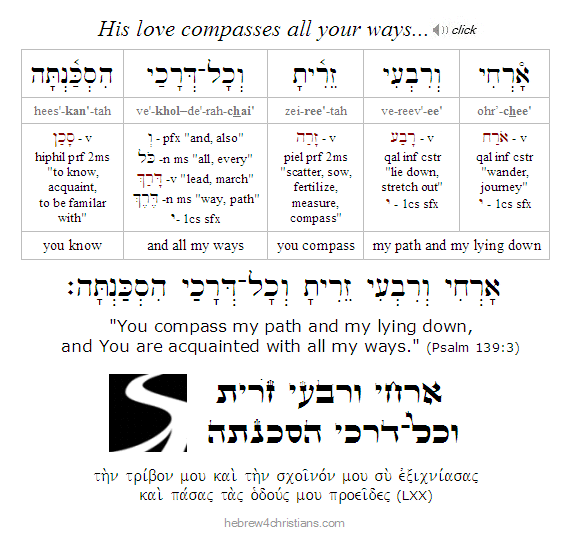 |
The cross upon which Yeshua died was likely no more than nine feet in length, to make it easy for the Romans to take the body down after death. This implies that, after inserting and securing it into place, the stake may have been just six or seven feet from the ground. Some might recall how a bystander filled a sponge with vinegar and then used a reed (κάλαμος) to give to Yeshua as he was upon the cross, but it is likely the reed was no more than 18 inches or so in length (Matt. 27:48). If these measurements are approximately correct, then Yeshua would be nearly eye-level to us as he was dying....
Imagine, then, walking up before the cross and seeing Yeshua look upon you as he was suffering. Imagine further him saying to you, "I know you; I know your secret sins, the pain of your shame, your heartache, your guilt, your loss... But I offer myself up for you; I take your place in judgment, so that by means of my death, you shall live..."
Hebrew Lesson
Isa. 53:5 reading (click for audio):
 |
Weekly Torah portion:
Parashat Ki Teitzei...
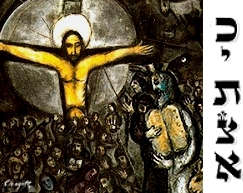
[ Our Torah reading this week (i.e., Ki Teitzei) is always read during the month of Elul... ]
09.08.24 (Elul 5, 5784) Shavuah tov v'chodesh Elul tov, chaverim. Recall that in last week's Torah reading (i.e., Shoftim), Moses defined an extensive system of justice for the Israelites and pointed to the coming Messiah who would be the rightful King of Israel: "The LORD your God will raise up for you a prophet like me from among you, from your brothers -- it is to him you shall listen" (Deut. 18:15). In this week's portion (i.e., Ki Teitzei: כי־תצא), Moses returns to the immediate concern of life in the promised land by providing additional laws to be enforced regarding civil life in Israel. In fact, Jewish tradition (following Maimonides) identifies no less than 74 of the Torah's 613 commandments in this portion (more than any other), covering a wide assortment of rules related to ethical warfare, family life, burial of the deceased, property laws, the humane treatment of animals, fair labor practices, and honest economic transactions.
Of particular interest to us is the statement that a man who was executed and "hanged on a tree" (עַל־עֵץ) is cursed of God (Deut. 21:22-23). According to the Talmud (i.e., Nezakim: Sanhedrin 6:4:3), the Great Sanhedrin (סַנְהֶדְרִין גְדוֹלָה) decided that "a man must be hanged with his face towards the spectators" upon a wooden stake, with his arms slung over a horizontal beam. It should be noted that while this is technically not the same thing as the gruesome practice of Roman crucifixion, the reasoning based on this verse was apparently used to justify the execution of Yeshua (Mark 15:9-15; John 19:5-7; 15). The exposed body was required to be buried before sundown to keep the land from being defiled. Besides the shame and degradation of this manner of death, the one so executed would be unable to fall to their knees as a final act of repentance before God, thereby implying that they were under the irrevocable curse of God (קִלְלַת אֱלהִים).
In this connection, we should note that Yeshua was falsely charged with blasphemy before the corrupt Sanhedrin of His day (Matt. 26:65; Mark 14:64; John 10:33) - an offence that was punishable by stoning (Lev. 24:11-16). However, since the Imperial Roman government then exercised legal hegemony over the region of Palestine, all capital cases were required to be submitted to the Roman proconsul for adjudication, and therefore we understand why the Jewish court remanded Yeshua and brought him to be interrogated by Pontius Pilate. Because Roman law was indifferent to cases concerning Jewish religious practices (i.e., charges of blasphemy), however, the priests further slandered Yeshua by illegitimately switching the original charge of blasphemy to that of sedition against Rome. The Sanhedrin undoubtedly rationalized their duplicity because the Torah allowed for an offender to impaled or "hung on a tree" (Num. 25:4), and since they were unable to do carry out this judgment because of Roman rule in the area, they needed Pilate to condemn him to death by crucifixion (Matt. 27:31; Mark 15:13-4; Luke 23:21; John 19:6,15). Note that crucifixion is mentioned elsewhere in the Talmud (Nashim: Yevamot 120b) regarding whether a widow can remarry if her husband had been crucified, as well as by the Jewish historian Josephus. The Talmud furthermore alludes to the death of Yeshua where Yeshua is said to have been crucified on "eve of Passover" (Nezekin: Sanhedrin 43a).
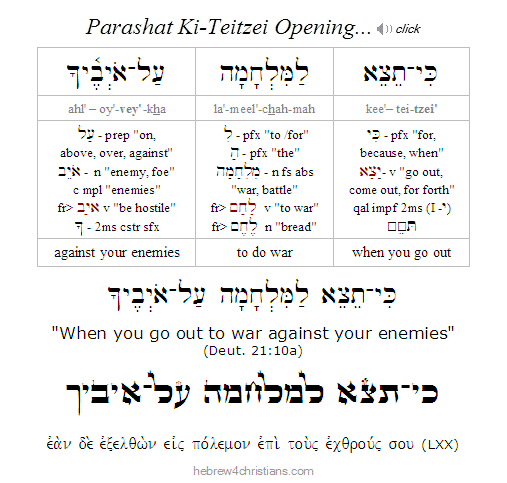 |
Shavuah Tov Podcast:
Parashat Ki Teitzei...

09.08.24 (Elul 5, 5784) Our Torah reading for this week (i.e., parashat Ki Teitzei) identifies 74 of the Torah's 613 commandments (more than any other), covering a wide assortment of laws related to warfare, family life, property laws, the humane treatment of animals, fair labor practices, and honest economic transactions, and more. The portion is always read during the month of Elul, and therefore it provides an opportunity for us to review the importance of the law in relation to the theme of teshuvah (i.e., repentance).
Returning to the Lord...
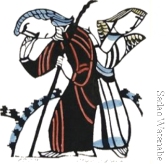
09.06.24 (Elul 3, 5784) The only way we will draw near to God is by believing that He draws near to us, personally, intimately... "Behold I stand at the door and knock" (Rev. 3:20). Faith "hears the knock" as God's desire to draw near... faith hears his voice and opens the door to his presence; faith believes to partake in his communion.... "Draw near to God and he draws near to you" (James 4:8). The Hebrew word karov (קרוב) is translated using engidzo (ἐγγίζω) in New Testament Greek, a word that means to come close and touch... When we draw close to God, we reach out and find God holding us. Our "I" melts away as we cling to God as our dear life; we become one with his heart; and by means of this blessing we lose ourselves to find ourselves...
Hebrew Lesson
Zechariah 1:3b reading (click for audio):
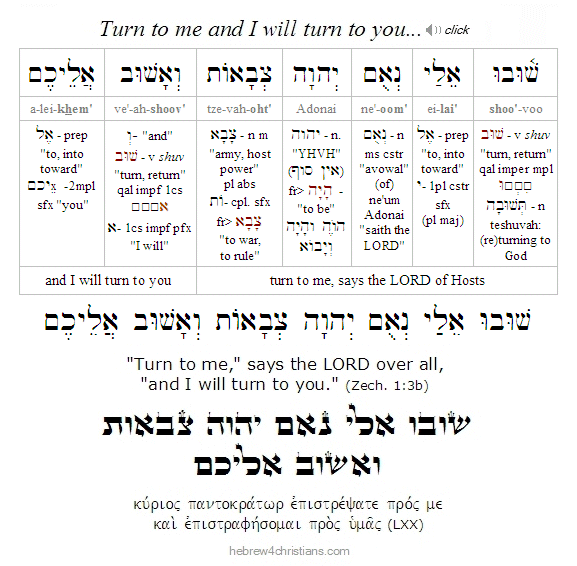 |
"Turn to me, and I will turn to you..." (Zech. 1:3). Someone might wonder why we must take the initiative, but that is because God has never turned away from us; he has always been the one who loves us most of all and awaits our return to his love.... "Turn to me and you will discover that I have never left you nor forsaken you."
Yeshua illustrated the idea of teshuvah (i.e., תְּשׁוּבָה, "returning to God") by telling the famous story of the "prodigal son" (Luke 15:11-32). After selfishly squandering his father's inheritance, a wayward son decided to return home, full of shame and self-reproach. "But while he was still a long way off, his father saw him and was filled with compassion for him; he ran to his son, threw his arms around him and kissed him." The father then ordered a celebratory meal in honor of his lost son's homecoming. When his older brother objected, the father said, "We had to celebrate and be glad, because this brother of yours was dead and is alive again; he was lost and is found."
This parable reveals that teshuvah ultimately means returning (shuv) to the outstretched arms of your Heavenly Father... God sees you while you are still "a long way off" (Rom. 5:8). He runs to you with affection when you first begin to turn your heart toward Him. Indeed, God's compassion is so great that He willingly embraces the shame of your sins and then adorns you with "a fine robe, a ring, and sandals." Your Heavenly Father even slaughters the "fattened calf" (Yeshua) so that a meal that celebrates your life may be served....
Note: I 've been sick the last few days but הַכֹּל אֲנִי יָכוֹל בְּעֶזְרַת הַמָּשִׁיחַ הַנּוֹתֵן בִּי כֹּחַ - "I can do all things through Messiah who gives me strength" (Phil 4:13).
 |
|

















































